
Closing in on a bit of Civilisation

Blog 65 by Mick: Day 3 on the Dirt – Closing in on a bit of Civilisation
Day 3 of off road riding
223km
Camp 2 to Luiza
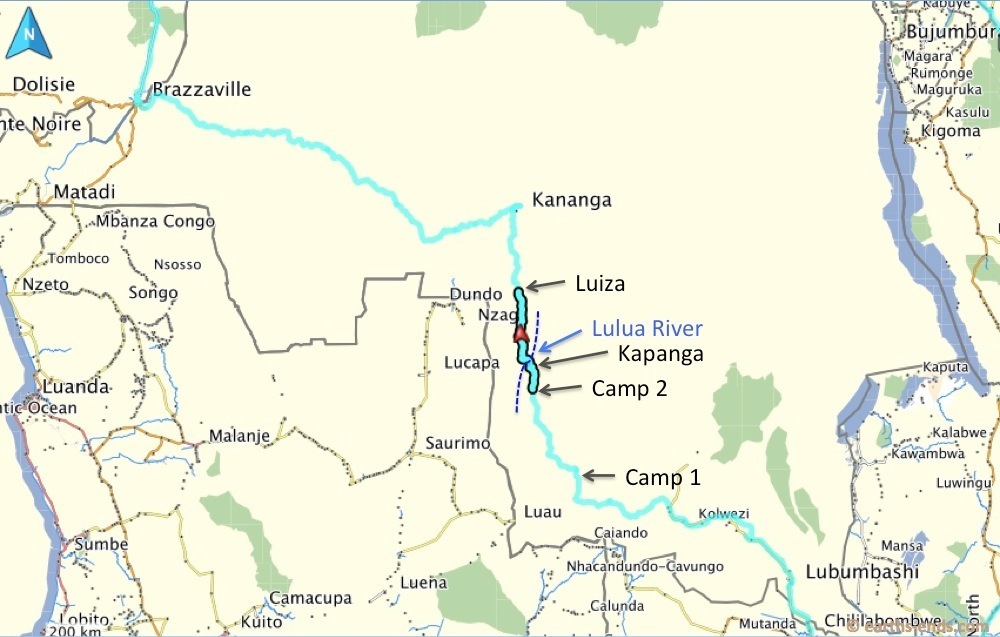
Map of our days action, from our roadside camp #2, through the town of Kapanga, across the Lulua River and to the town of Luiza 223km to the north.
With no onlookers on this second morning we were afforded some time and privacy for a more normal start to the day, including some tea and breakfast before packing up to leave. We hit the trail about a quarter to nine in a bit of a state… as the sun warmed up we found ourselves bombarded by a swarm of tiny flies which were attracted to any moisture, meaning they ended up all over our skin including in our eyes and nose… and by ‘in’ I really do mean IN, the flies were small, like midgies, and would land on our eyeballs and then would get stuck behind the eyelid when we blinked. Before leaving I had to carefully extract 2 dead flies from Tanya’s eye while making sure no more went in before we could even go anywhere.
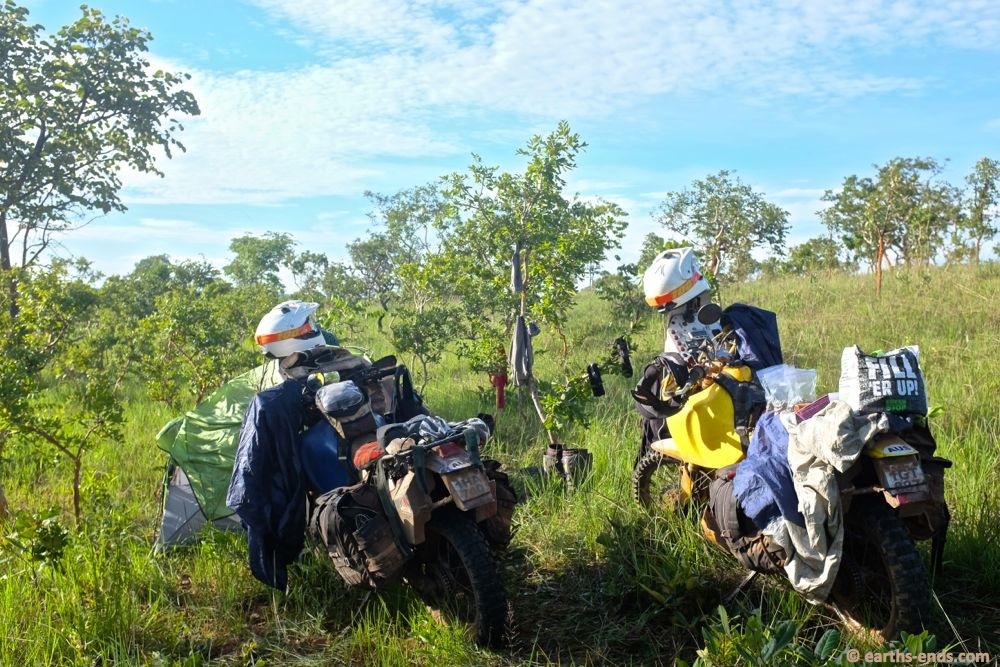
Packing up in the morning and trying to get a bit more sunlight into our moist socks and riding gear. Today would be day 3 and the socks especially were getting bad…
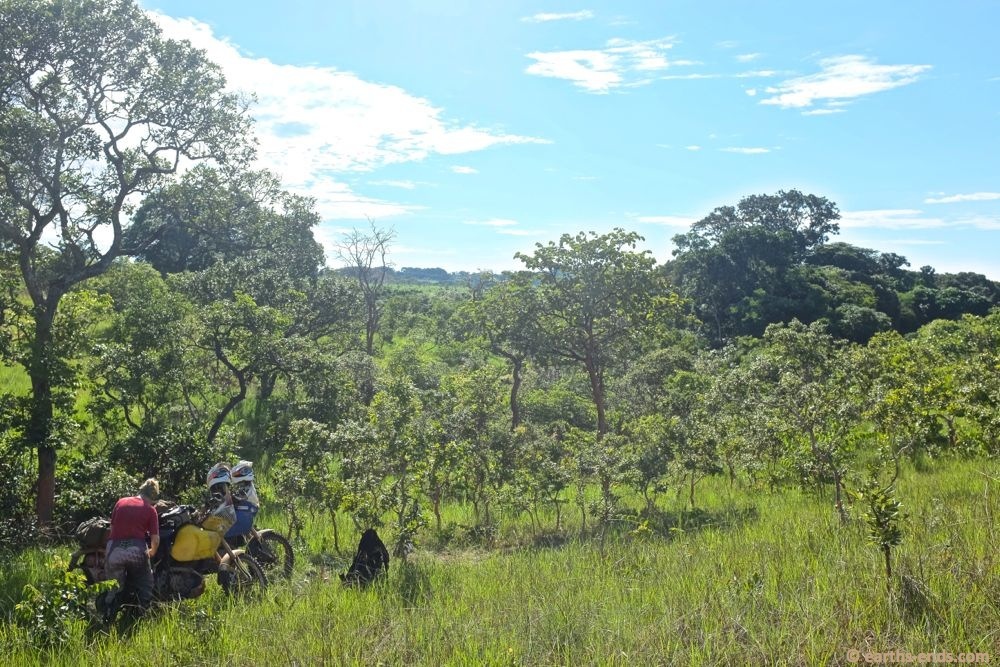
Sun’s out, flies are out… shit we gotta go! They were maddening.
The road was decent and we took an hour to ride the 40kms left to the first major town we had seen since leaving Kolwezi, Kapanga. With a bigger town we come across cops more determined than the usual “stuck out in the sticks” variety we had met so far in DRC who we had been quite successful in dealing with. These ones were more savvy though… on the edge of town they stop us and we go through the usual shit… Where are you from? Where are you going? Blah blah blah. We answer these common questions and show our passports and visas when requested and then they start to knuckle down…
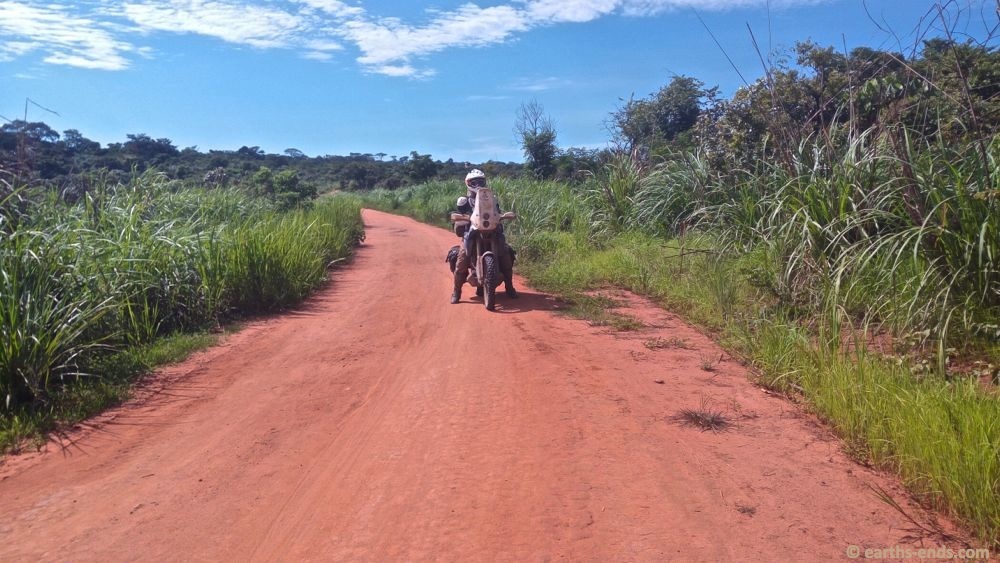
The road north to Kapanga – easy gravel in good condition. It was clear we were near a town as the “roads” actually were road-like.
They next requested to see our bike papers, including insurance. We weren’t real keen on doing this for 2 reasons; firstly, it is likely just a one-way street to some fabricated paperwork problem that would ultimately result in a request for a bribe to resolve. We invariably wouldn’t have the right form or the right stamp or some such thing, and we would be stung for it. Up until a few years ago when the laws were relaxed, permits were needed for movement between provinces within DRC. But even though they are no longer needed, Cops are known to pressure and intimidate foreigners who aren’t aware of the law change. So, we figured our best defense would be to not start the process of showing any papers at all and simply not give them an opportunity.
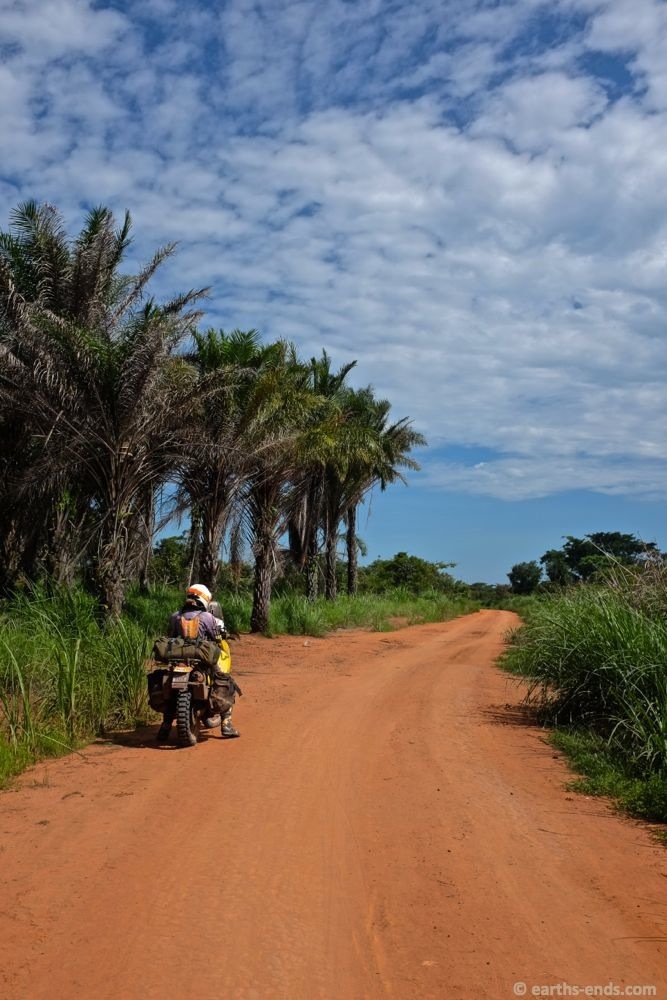
Easy roads with some nice tropical views, a great way to start the day
The second reason we didn’t want to show papers was more important though, we did have a genuine paperwork problem. Our COMESA insurance that had covered us through eastern and southern Africa had expired. We had unsuccessfully tried to renew it in Lusaka, but Zambia had stopped issuing insurance to foreign registered vehicles… So with no options, we did the African insurance equivalent of a school kid’s D- miraculously turning to an A+… we had modified the validity dates on our hand written insurance with a pen. Instead of a useless bit of paper that had once been valid from 06/06/2015-06/08/2015, we now had COMESA insurance from 06/08/2015-06/08/2016. It looked ok, in-fact it actually looked pretty decent, but it wasn’t a perfect forgery and with a very long 12 months validity it was suspicious, so I wasn’t keen on using it if I didn’t have too.
So when asked if we had insurance, I answered that we did… but didn’t offer to show it. When he asked again, some cat and mouse ensued… I went from (really) bad French to English and he went to sign language. I tried to change the topic to the road conditions, then distract him with the gps and the intercom (both often successful strategies), then tried to send him on to Tanya when none of that worked.
When he reverted to blatantly demanding money, we had a novel and quite heartening experience. A vendor selling a few things from an informal stall on the side of the road starting shouting out the coppers in the local language. We didn’t understand a thing except for a few uses of the French “touriste” and a lot of wild gesticulating, which translated basically to “leave them alone and get back in your box you greedy bastard”. Which he then did; the cop backed off and waved us through… We gave the vendor a nod of gratitude on our way past and made our way into town.
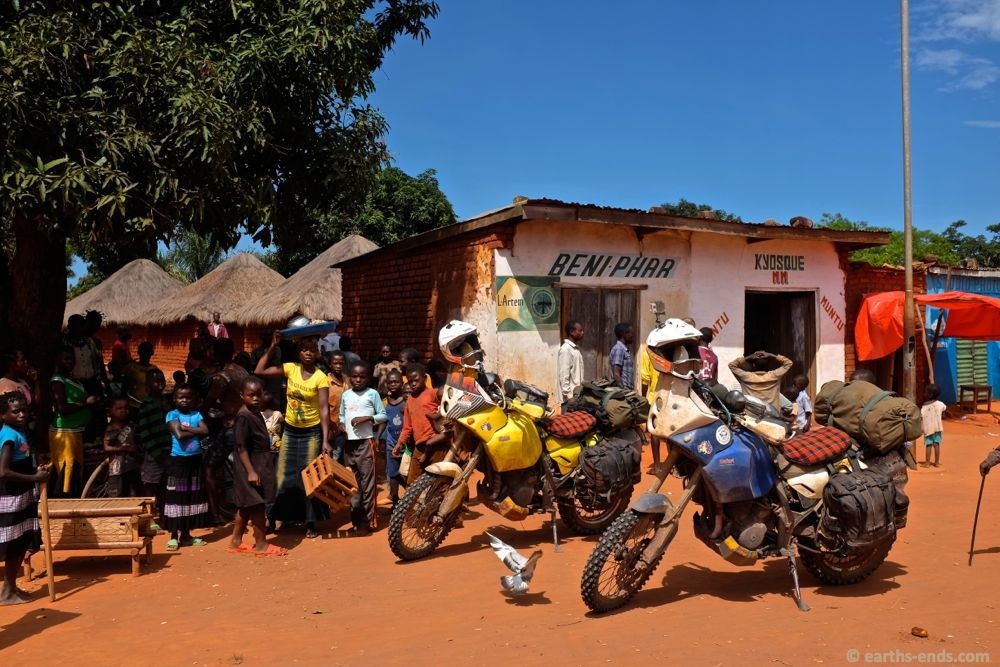
We stopped at this little stall in what we thought was Kapanga, but was actually Musumba, and bought some bread and a few other little snacks.
After a few days on the road we needed water, and after a false start trying to get free water from a (what looked) closed mission, we were directed to a small market. While Tan went inside to buy water, a bloke walked up and said something that sounded like “blahblah blahblahblah bureau du Direction Générale de Migration”… the dreaded Department of Immigration is known locally here as the DGM. Technically, all foreigners in DRC are required to present to the offices of the DGM as they pass through towns (thankfully the DGM only has offices in big towns) and register their presence. This is supposed to be for their safety, but the reality is it is just another opportunity for corruption. We had heard and read of enough horror stories of DGM officials holding passports hostage that when I heard those three words – Direction Générale de Migration – I pulled the oldest trick in the book: the dumb-tourist-no-speakie-the-language card. I love that card.
“Je ne comprends francais, je suis touriste”
He got the message and walked off. I didn’t feel too bad about blowing him off as it wasn’t so much of a lie, my French really is bloody abysmal, probably best described as a heinous crime against language, especially one like French. That said, while I didn’t grasp all the words I did understand his message quite well that he wanted us to follow him to the DGM. However, that just was not going to happen. But old mate wouldn’t give up so easy. As we packed our water and were about to saddle up he returned, this time with an English speaker in tow…
This new fella went on to explain in quite clear English that we needed to follow him to the DGM…. “Sure” we said, “we will hop on the bikes and follow you to the office”. He led the way while we got on the bikes, coordinated on the intercom and blasted past him side by side and onwards down the road. There was quite simply no way in hell we were going to that fucking DGM office. Just straight up not bloody happening, not without a rope to tie me up and a tractor to pull me there. Old mate tried to wave us down and then he chased after us on foot, but he gave up quite quickly when the futility of running after motorbikes hit home.
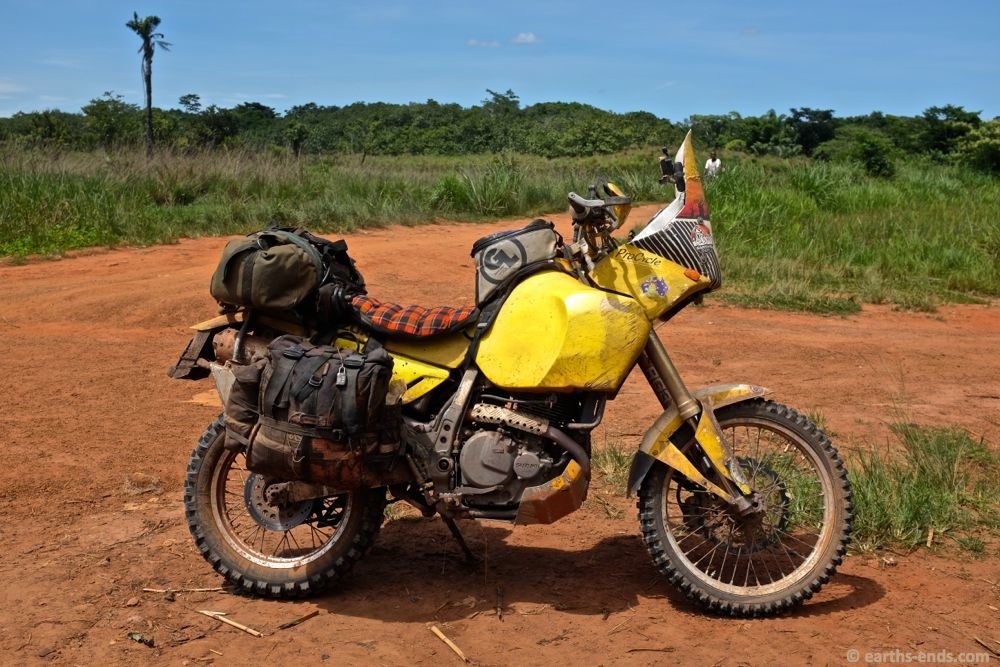
Tans bike loaded in Congo mode
On the way out of town we ran into a missionary working on the side of the road. The opportunity to speak to a foreigner who was living in this environment was just to good pass up, so we stopped for a chat. Turns out this bloke was Belgian and worked at the Kapanga Catholic Mission, which wasn’t actually the town we were in as I thought we were; we were in Kapanga’s sister town of Musumba. The things you learn when you travel without proper maps. Also turns out the mission we had just gone to looking for water was a Methodist Mission which wasn’t closed at all, it was just an enormous complex with one lonely bloke living in it. It seems that attracting missionaries to towns in the middle of nowhere like this one is pretty hard work. Especially as missionaries come in and work for 12-18 months on projects, like this guy who was working on some water reticulation for the town.
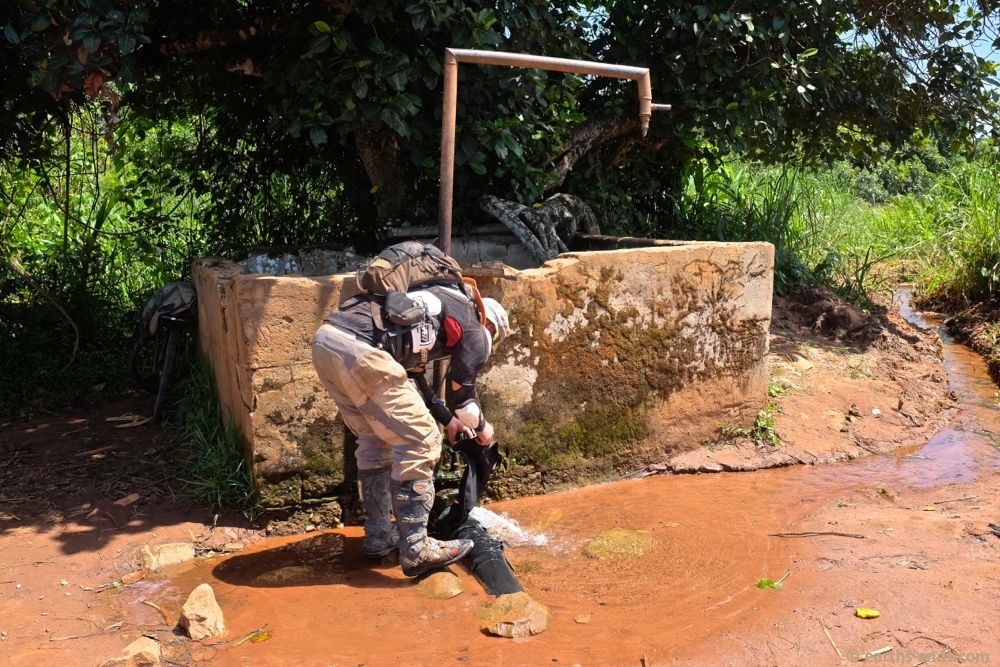
Getting some water from a local well. The water from the shop was really dear, USD2 for 1.5 litres, so we bought enough to drink for the day and hoped we would get some for free later. The Belgian missionary told us about this one, it was safe and everyone drank from it so we filled our water bags. Co-ords are S8° 22.335′ E22° 36.812′ for anyone who needs it.
Imagine if you need work done on the town water pipes and you had to wait for some generous missionary to come from Belgium to do something about it? Yeah, that’s Congo.
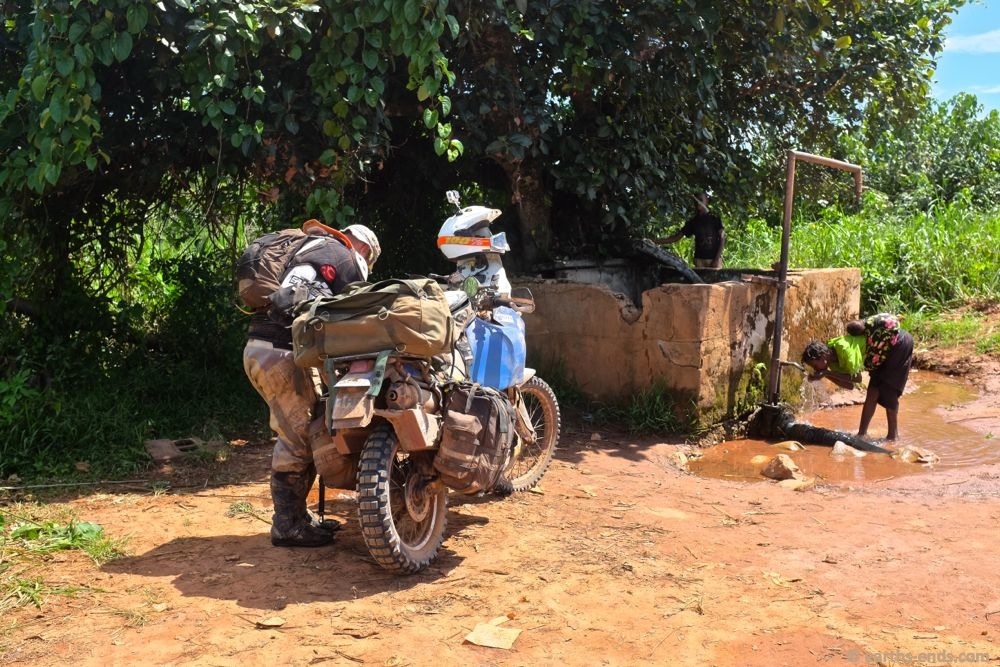
Loading up our supply and a local drinking from the well. We had double checked from some locals standing around hat it was safe to drink, which they had, but it is always reassuring to see someone actually drink it!
We had a chat about road conditions and he mentioned that they only drive within the immediate region, if they need to get out of Kapanga they fly. So he couldn’t give me much info other than we would have to catch a ferry over the Lulua River about 20kms north. He also mentioned that they very very rarely see foreigners at all and especially not travelling across the country like we were, just a handful a year, so he was pretty surprised to see us. When the missionary went on to mention something about the local DGM, I got a reminder that there may well be a quite pissed off government official in town looking for us, so we bid farewell and legged it, but only after getting a tip for a nearby well we could get some safe drinking water.
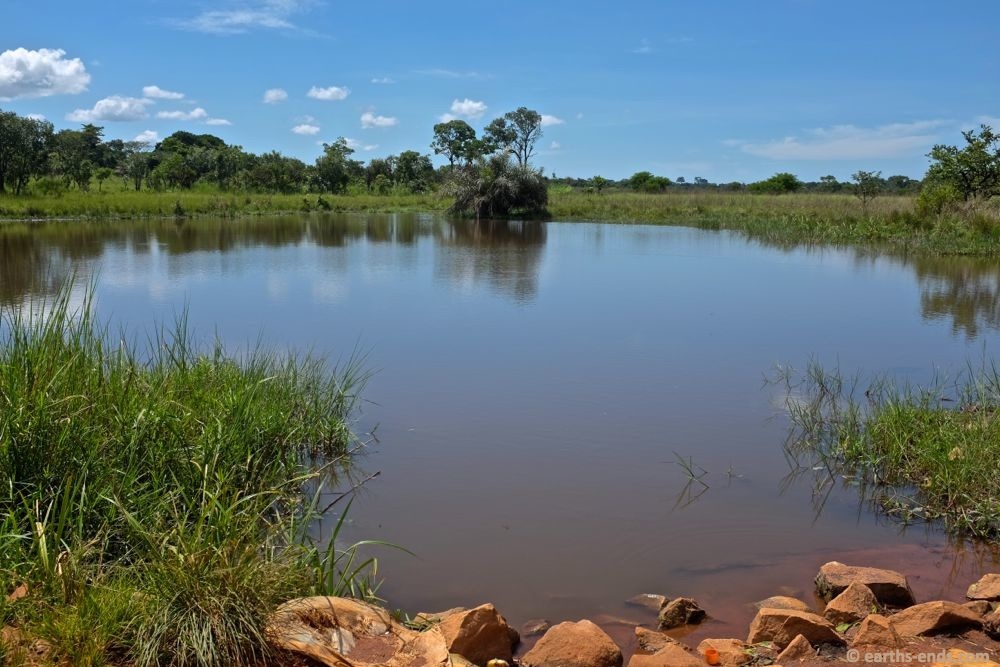
Pond filled from the well that was constantly running – there were lots of locals washing themselves and their clothes in here.
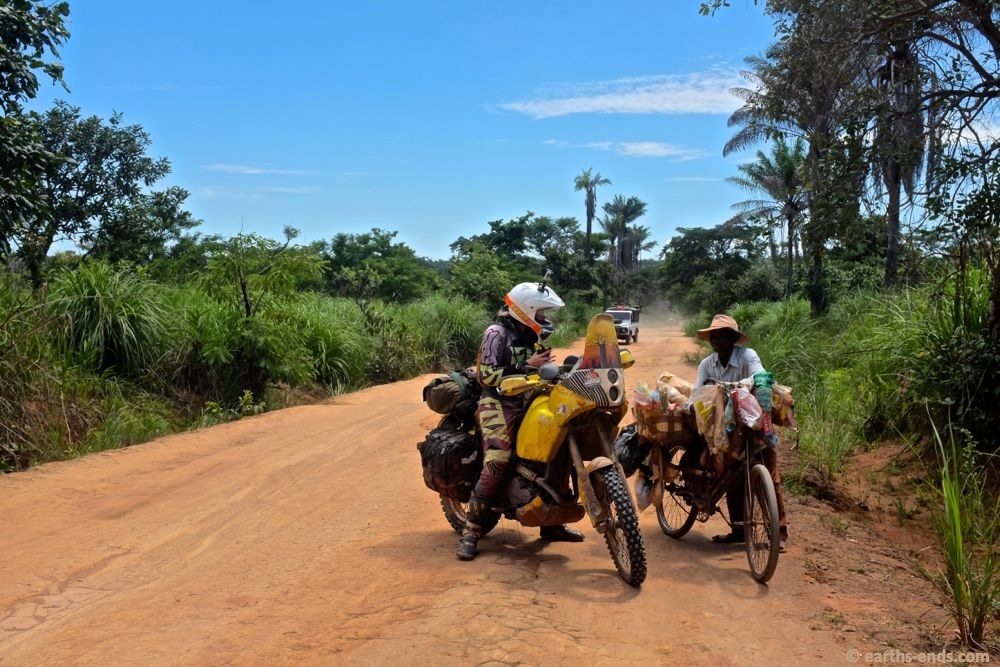
The small section between Musumba and Kapanga, we came across the mobile vendor selling all sorts of stuff from his bicycle. The Landrover in the background was the Belgian missionary driving back to Kapanga.
Ok, coming up now is the last checkpoint story for this post… promise.
So on the way out of Kapanga we see the obligatory police checkpoint – there is always one on both sides of towns any bigger than a small village. So we rock up all friendly like we try to do but guarded as you tend to be in situations like this, and are greeted with some really friendly guys. It was a nice change. We chat about the bikes and how fast they go and ‘yes, we really are riding all the way to Kinshasa’. We show them our passports and share a few cigarettes, which they appreciated. One of the junior guys comes out of the office and logs our ID and also the bike’s details in a grotty old ledger, writing down the rego numbers which was an uncommon experience. He then wanted to write down the chassis number… shit these guys are on it! First time in Africa someone has wanted that!
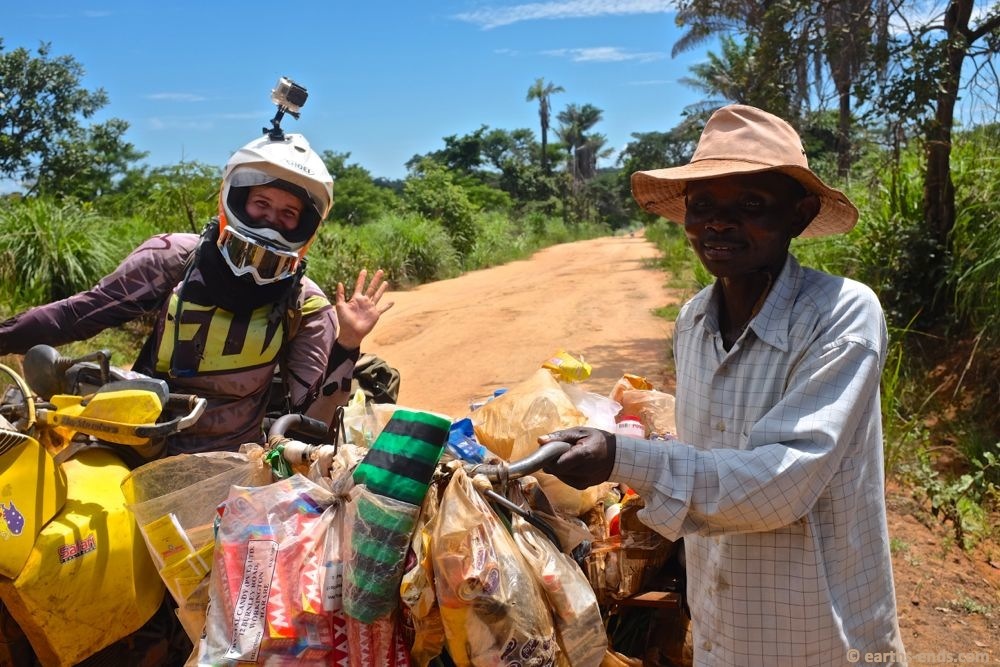
We bought some sugar and a few little supplies from this guy. You can see it’s a motley collection of things to sell. Tootpaste. Cloth. He had needles and thread. Panadol. Matches. All for sale as he rode by.
So I show him the Compliance Plate on the headstem with the VIN code on it, and he gets busy with the pencil. I have a bit of a look and get confused… I look closer and old mate has just written down the first number he has seen on the plate which just so happens to be the approval code for compliance with the Australian Design Regulations that all motorbikes must comply with, “10847”. I have a bit of a chuckle in my helmet, but he is happy with what has just happened so I leave him be. He then proceeds to do exactly the same thing on Tanya’s bike, and is equally happy there, even though he has just written down the same 5 digit “chassis” number for both bikes…
Anyway… moving on.
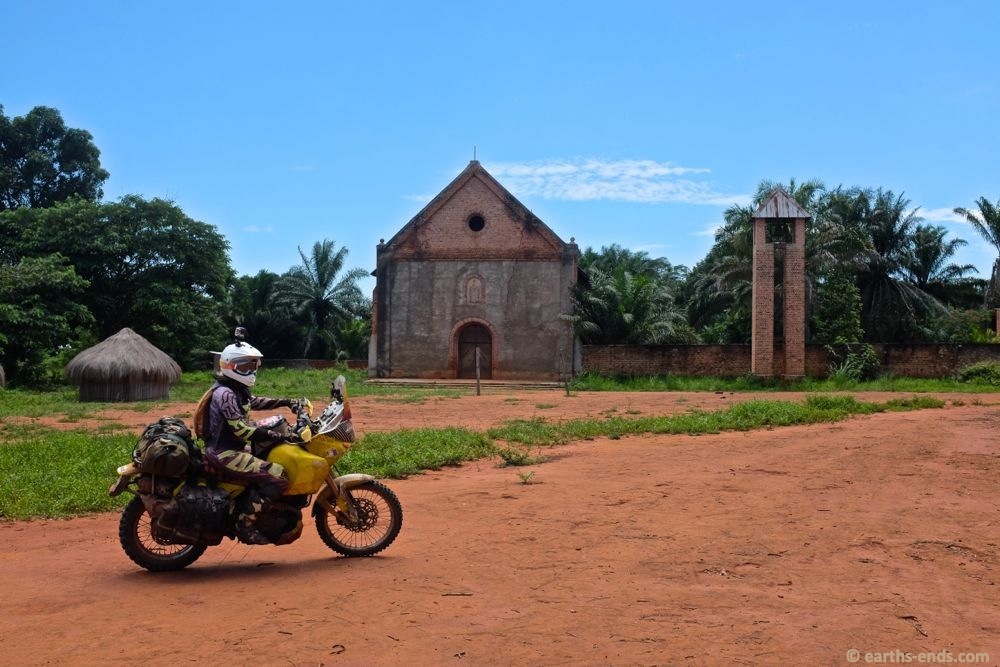
The Kapanga Catholic Mission. There are heaps of these missions throughout Congo, all the bigger towns have one, or more.
The road was in decent enough condition so it was a relatively quick trip up to the Lulua River, which was a surprising site when we arrived. The river is pretty substantial, at a guess I’d say 40m bank to bank, maybe 50. There was a collection of guys sitting under a grass roof nearby, a few dug-out canoes moving people back and forth and a single vehicle diesel ferry parked and boarded up on the bank. Situations like this are never great… you need to cross the river and there is only one-way to go about it. They’ve got you by the balls and everybody knows it… the best you can hope for is to keep the squeezing to a minimum.
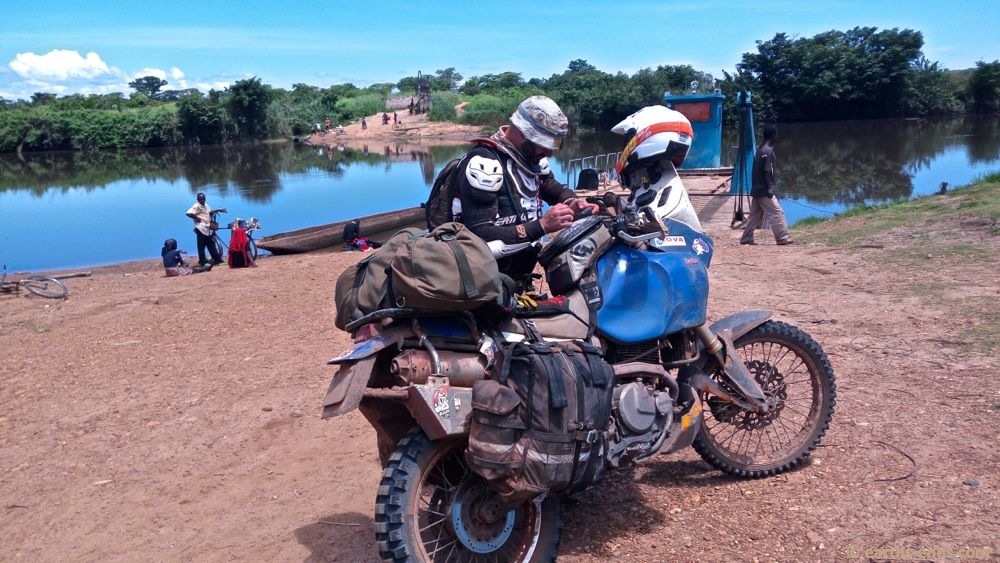
Arriving at the Lulua River and checking the GPS… “so where the fuck are we, actually?”
We never really rush at places like this. Borders are the same. You are at the mercy of others so it is best to play it cool. So the first thing we do is park up the bikes, take off our helmets, put on a hat, and have a drink and a snack. A few minutes later, one of the blokes under the grass roof has had enough of the curiosity and walks up and starts to chat. He says the cost to use the ferry is 5000 francs per bike, about USD11 all up. Not a great deal of money, however probably a little more than I was expecting and nevertheless, our reflex response when negotiating in Africa is always “no its too much”. Even if had said the cost was “half your navel’s current accumulation of lint”, being Africa, the response would always be “no its too much, my belly button is really chockers right now, its full, and its everything I’ve got, I really need that lint, its good lint, I’ll give you a fifth of it, no more”. It’s just instinct – you have to learn to put up a fight and haggle otherwise you’re just fodder in the African meat grinder.
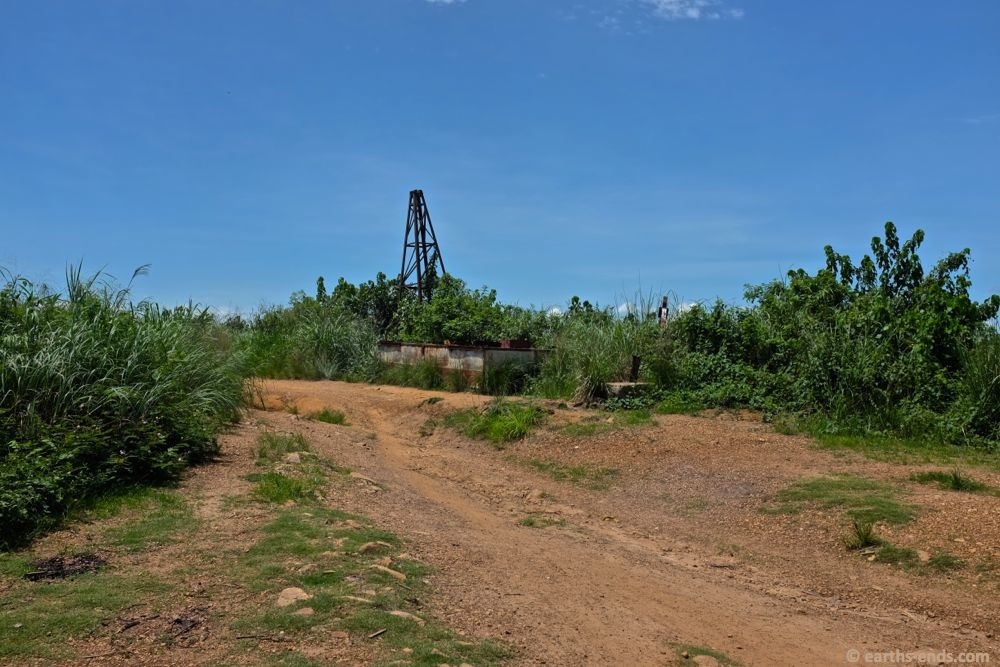
There used to be a proper cable operated ferry here, obviously now destroyed. In the previous photo you can see the corresponding tower on the other bank. That’s one frustrating thing about Congo, once upon a time it did at least have “some” infrastructure. Now though…. Nope.
I offer him 5000 francs for both bikes, but he balks at that. I tell him 10000 is way too much, and we don’t even know if we really want to cross the river or not, we are just here for a look and might go back to our friend the Belgian guy at the Kapanga Catholic Mission. It’s a blatant lie, and not even a good one as it’s quite obvious we are there to cross, and the ferryman is not at all perturbed. He sticks to his guns of 5000 per bike… a stale mate, and he walks away.
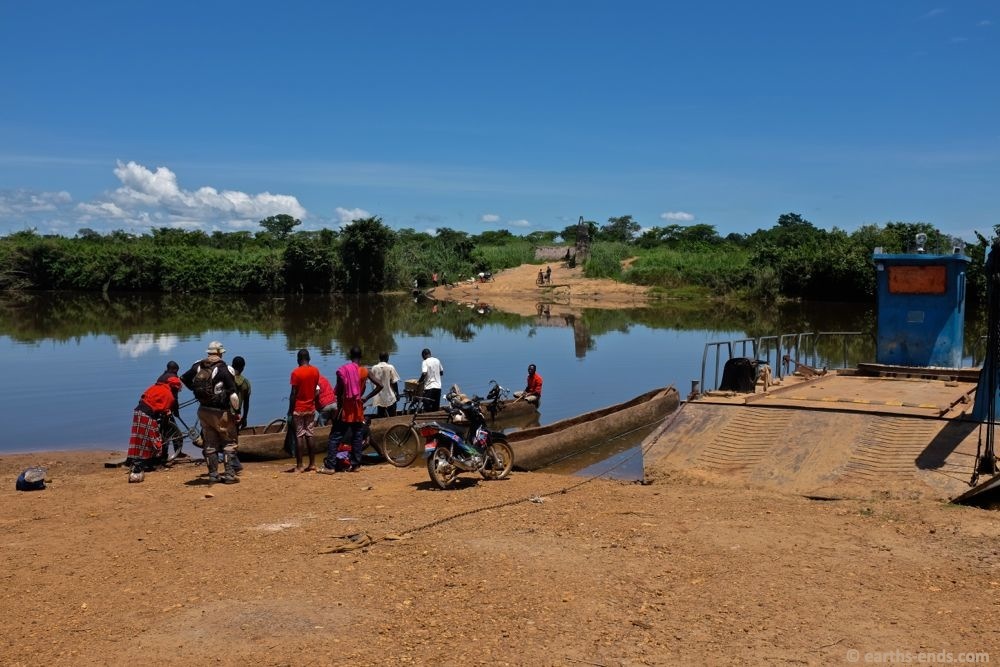
Chatting with the fellas operating the dug-outs ferrying a constant trickle of people and goods back and forth over the river. That little Chinese scooter had just come south and all the bicycles were now heading north.
After some more time waiting I figured I’d try out the guys paddling the dug-out canoes over the river and ferrying locals back and forth. The dugouts were big and sturdy and in the time we’d been there we’d seen one or two little Chinese scooters cross over. Based on our experience back at Lake Eyasi in Tanzania where we used a tiny little dugout to cross a river, its clear our bikes would fit in these dug-outs no problem at all. But the canoe guys wouldn’t have a bar of it, they wouldn’t even consider considering it, which made me think they were concerned about the reaction of the ferry operator. Bummer. This option was out the window, we would have to negotiate some more with the ferryman.
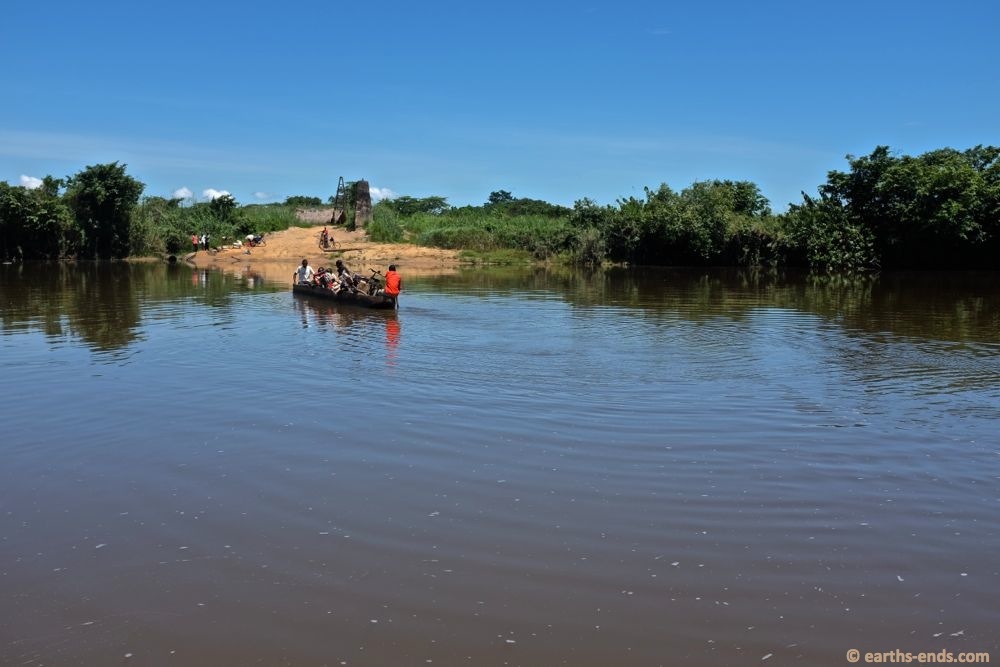
The dug-outs going over… this is how “infrastructure” works for average Congolese. Remember, this is the N39 – a major National Highway.
We are back to square one when a fellow appears out of a dug-out which has come from the other side. He approaches and says he will take us across on the ferry for 10000 francs per bike, double what the first bloke told us! “Nah mate”, we tell him we know that is not the price, so he suggests we pay with 10 litres of diesel to run the ferry… Diesel? Now, I know the DRs are low tech and tractor-like, but, no, we do not have any diesel. By now 40 minutes has gone by and we are starting to run out options.
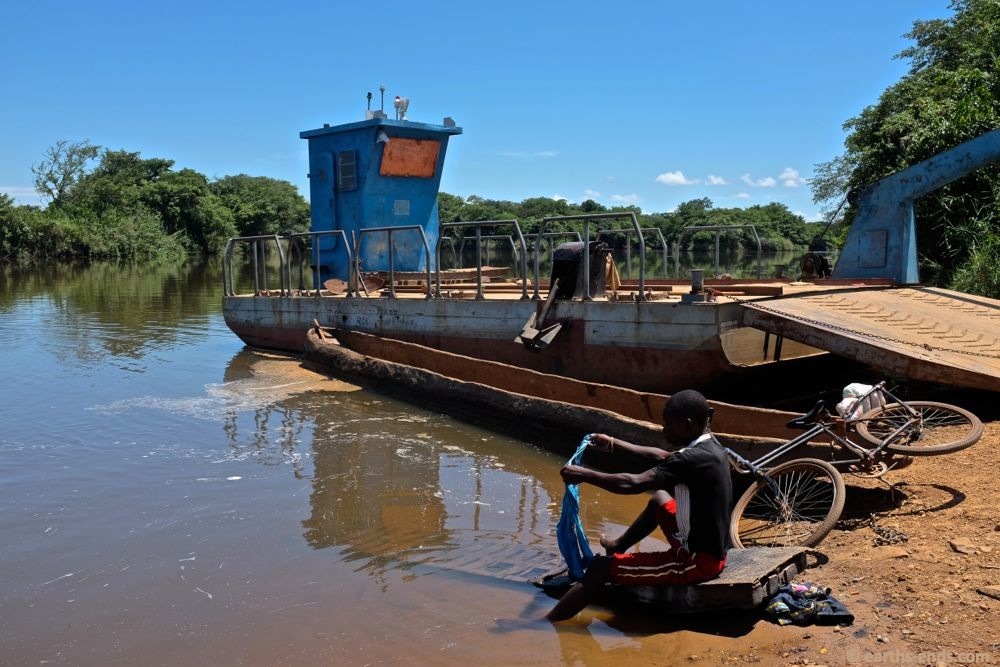
Old mate washing his jocks in the Lulua. Considering the smell of mine and with not much else to do while waiting I was tempted to do the same….
One thing we had learnt quite well here over the previous 16 months was that people in Africa won’t do any work at all with out a deal agreed to, and often, money put down in advance. Which, I think at least, is bloody prudent considering Africa’s general deficiency in money and prevalence of people trying to take advantage. So when the ferry driver turned up and started to take the boards of the cabin of the ferry, I realised we had been gifted something quite extraordinary – the negotiating “box seat”. The driver had come to take us over and started getting ready to do so, and we hadn’t even settled on a deal yet… We had gone from a position of utter weakness to one of significant power.
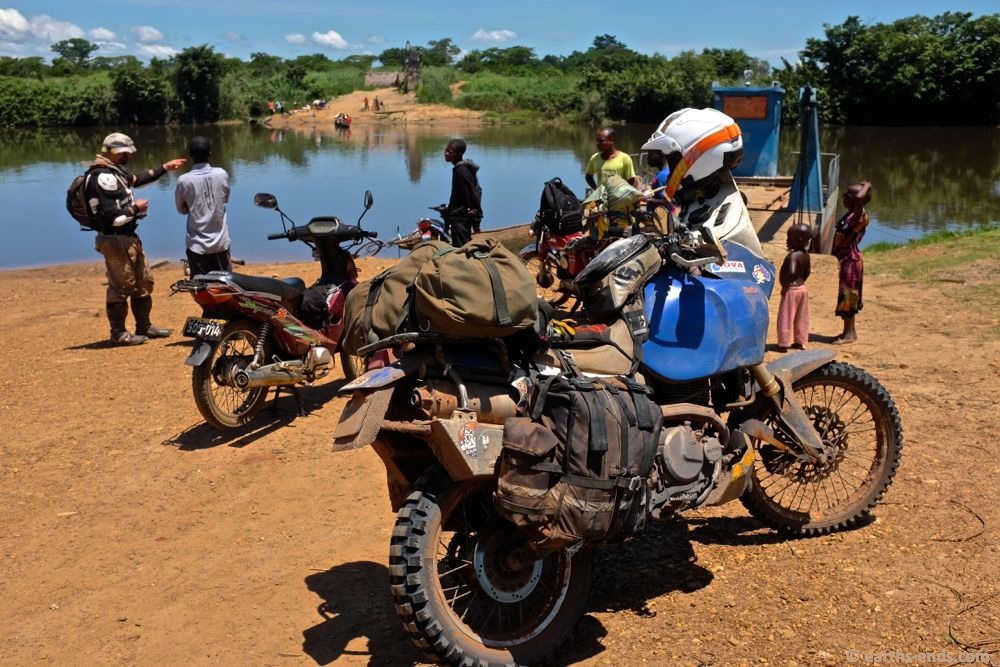
Starting to squeeze the ferryman pretty hard…
So when the first guy comes back to talk about us going over the river, I stick to my guns and offer him 5000 francs for both bikes. But he sticks to his and the price of 5000 francs each. Around and around we go, all while the ferry driver is checking out the motor and hooking up the battery. I walk away and over to the ferry to check it all out and see what is going on – the driver is checking out the motor; it is some 3cyl diesel sitting in a bath of oily water floating around in the engine compartment. Back with the ferryman I tell him 10000 is too much for us we might head back to Kapanga and talk to the missionary there.
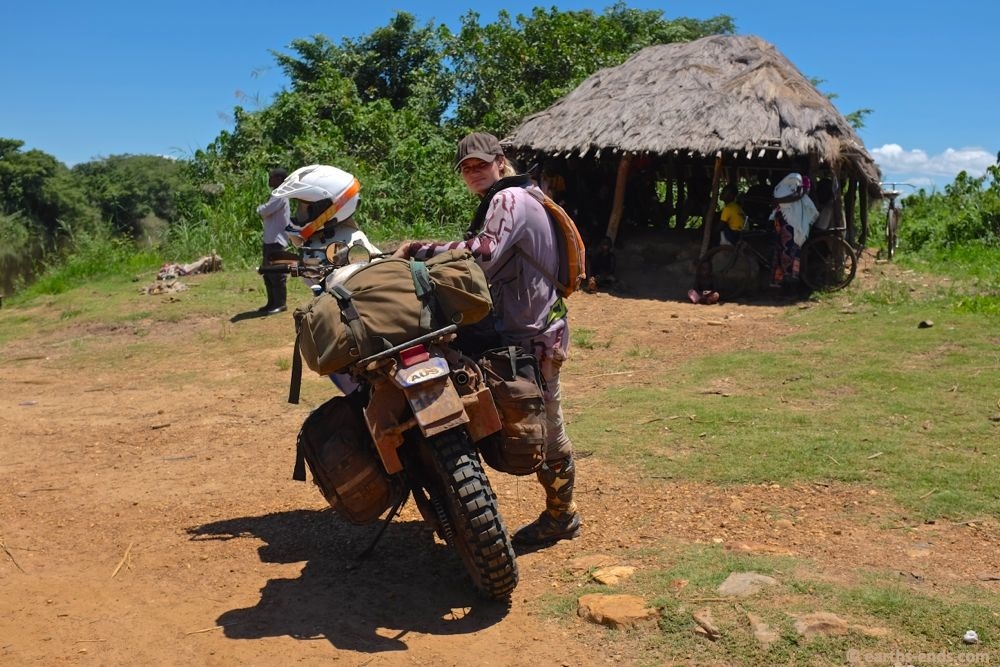
Tan playing it cool: Hat on head… Smile on face… Don’t give up, don’t get desperate and don’t try and force the pace. You gotta stay determined but you gotta be patient. This is good mentality to deal with any situation in Africa and often takes us westerners a while to get our head around it and accept it. Africa works on Africa time.
The driver cranks the boat’s motor over a few times and the fella in front of me looks over his shoulder at it worryingly… a few more cranks and the boat comes to life with a puff of black smoke and the small motor idles nicely: dak dak dak like a good little tractor. 5000 for both bikes I ask one more time. The tables have completely turned… I’ve got a handful of ferryman knackers and am squeezing with vigour. It’s a novel experience and I gotta admit, it was a really damn nice feeling after been taken advantage off so much. He is nervous and squirming hard, but he again says no, it is 5000 francs each. He then goes on to quickly explain that to cross the river in a canoe is 1000 per person, 1000 for a large piece of luggage and 3000 for a small motorcycle. While that sounds like a lot, the way he says it leads me to believe him.
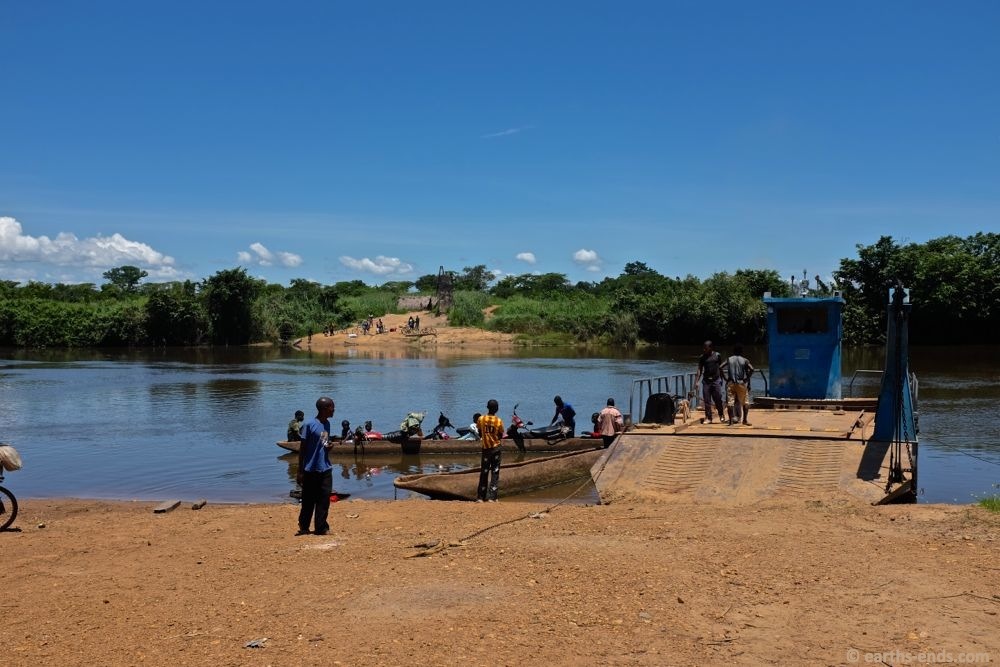
Driver prepping the single vehicle diesel ferry. Cabin boards off… battery connected and motor checked over… This is when the tables turned.
When I see the look of nervousness and genuine worry in his eyes again, I realise that, yeah, the price must really be 5000 francs per bike. This poor bloke is now shit scared that we are going to turn around and head back to Kapanga, and he will have to suffer the wrath of the ferry driver for waking him from his siesta and starting his boat up. “No worries mate” I tell him, “I was just pullin ya leg, 5000 per bike no dramas”. He is relieved, we load the bikes and a bunch of free loaders with bicycles get on board as well. I joke with the ferry driver that we should charge them all 1000 per person and 3000 per bike and split the profit, but the idea sails over his head. I didn’t see any money change hands, I think these guys wait and wait and wait for a ferry and when it crosses with a paying customer they get a free ride.
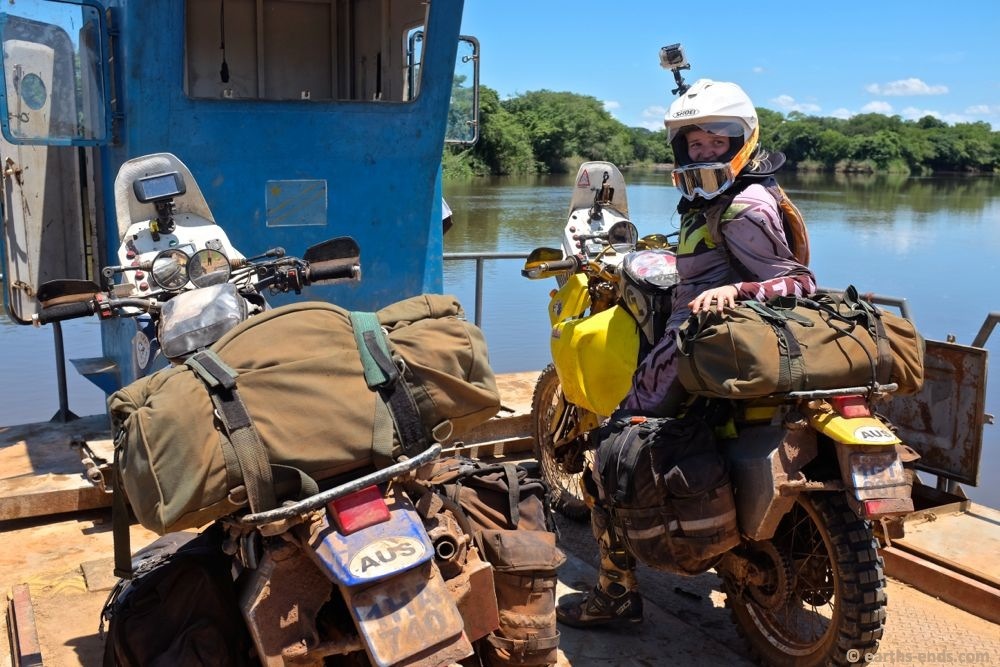
Tan looking happy that we are getting somewhere finally.
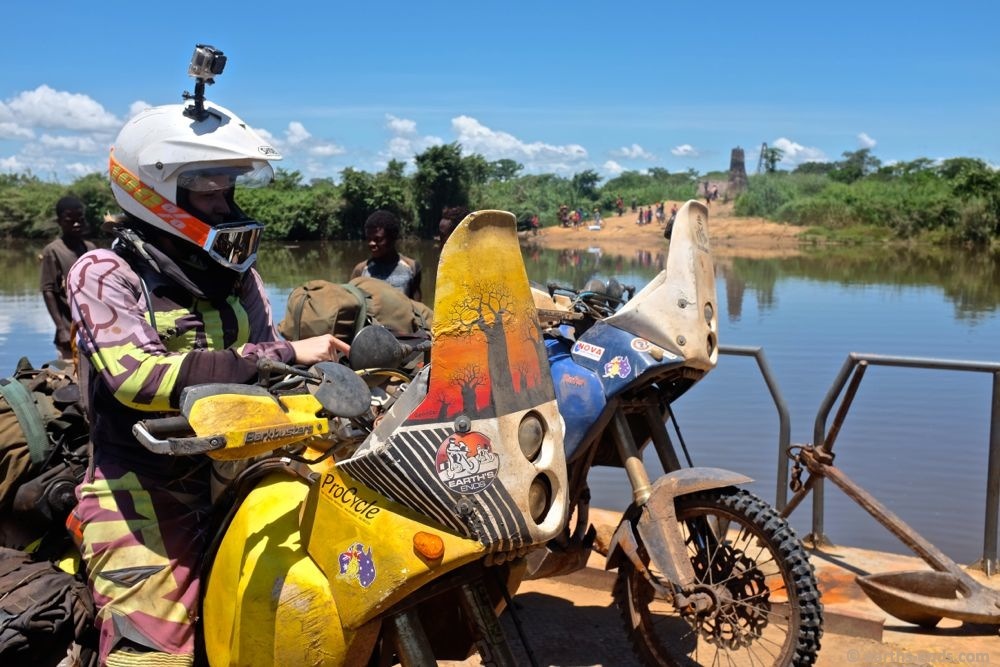
Our destination: the northern side of the Lulua.
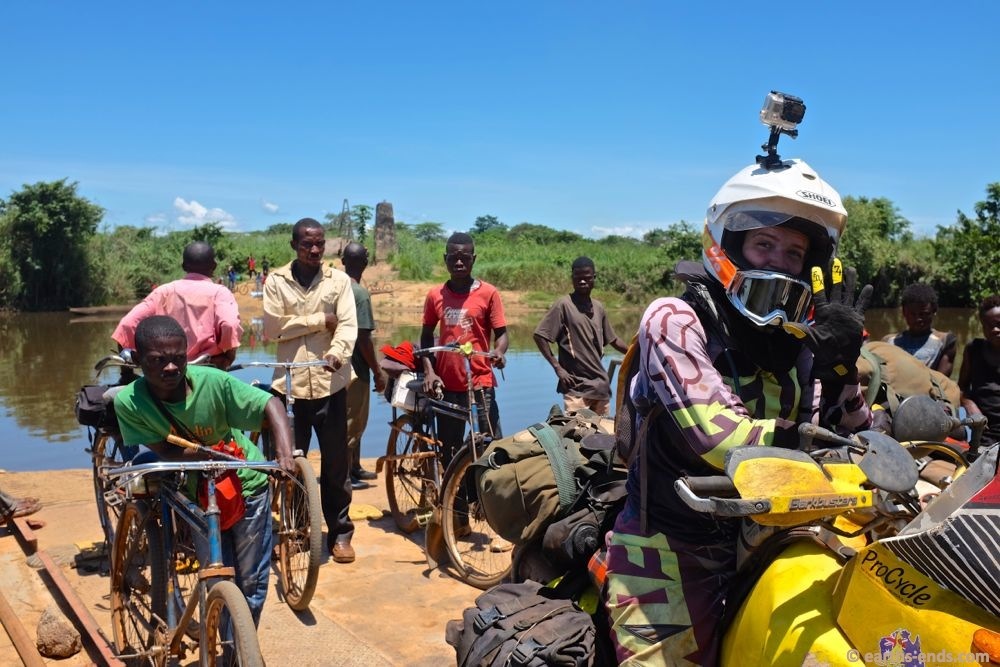
All our freeloaders… Not sure why old mate in the green shirt was frowning so much… I should have charged him 4000 francs!
We paid the ferryman once we got to the other side, just like the song says we should, and went on merry way not thinking too much more about our river crossing. But looking back on this little episode with the benefit of hindsight, this was a good first lesson for us and one we really only fully grasped when we were leaving Kinshasa 2.5 weeks later: most Congolese, especially at lower level, are actually quite gracious and somewhat trustworthy. The cops and other government officials I wouldn’t trust with an extended and electrified barge pole, and any kind of high level business where corruption if rife I would be extremely cautious, but commerce at this low level was just people trying get by doing business with people also just trying to get by.
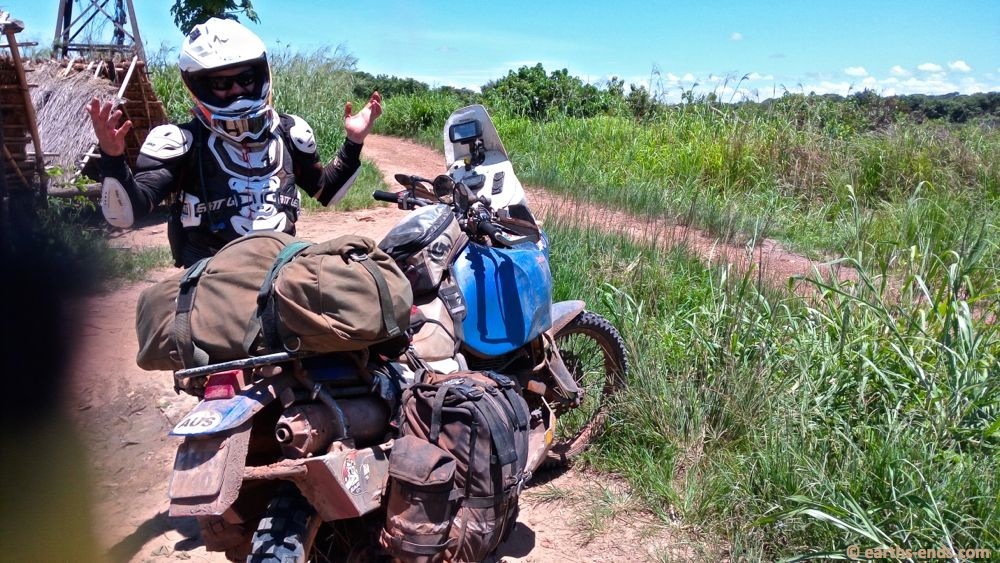
Over the other side and Tanya struggling to get the camera out and get a photo in time. I’m like “well, you shoulda said!”, she’s like “I want a photo, go back and do it again”
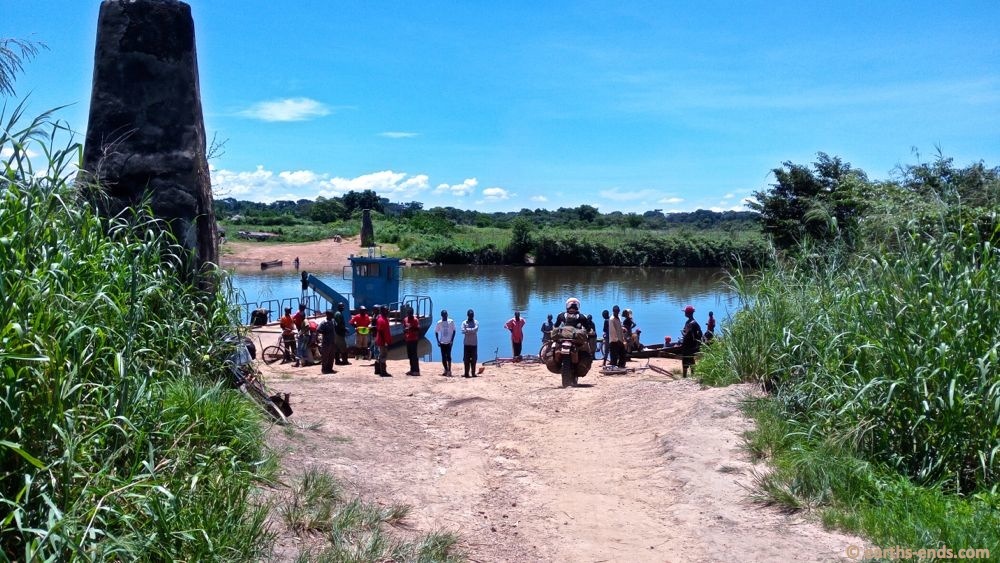
Heading back down to stage a “Mick getting of the Lulua Ferry Photo”
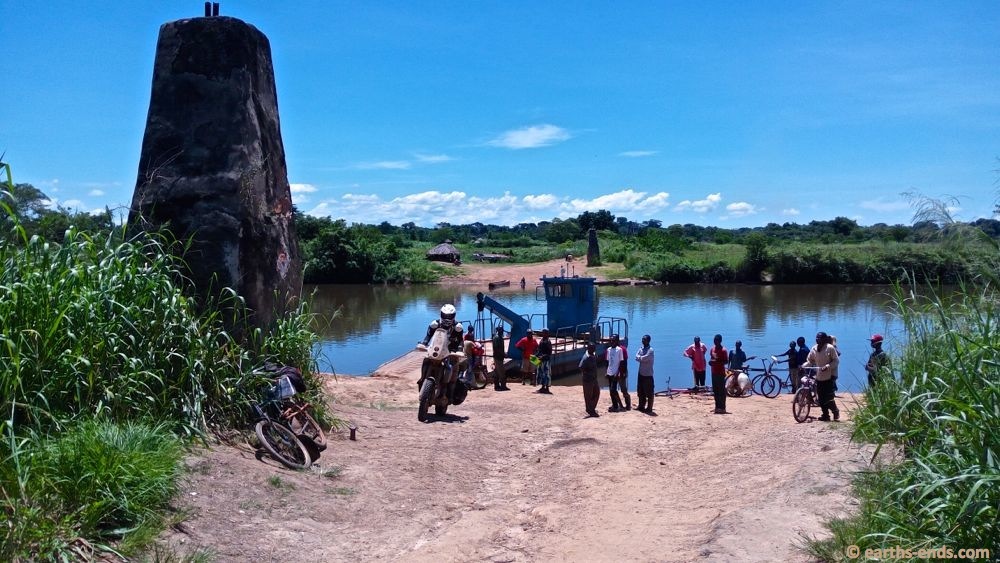
We very very very rarely stage photos, we just don’t really give enough of a shit to do it, but this is one time where we did – we wanted a good photo record of crossing the Congo because its not done often. Anyway, even though it is staged I can assure when I did get off the ferry for real it really looked an awful lot like this.
At this low level, there are so many people out there with more power and/or money trying to screw them that it seemed to us (granted, from the outside) that average people look out for average people. The first ferry guy we spoke with actually wasn’t trying to rip us off (the second fella who came along certainly did, but we will ignore him for now), he told us the price and it was the actual price. The street side vendor telling off the cops for trying bribe us on the way into Musumba/Kapanga was another recent example of that – most average people are sick of being taken advantage of and are actually looking out for average people.
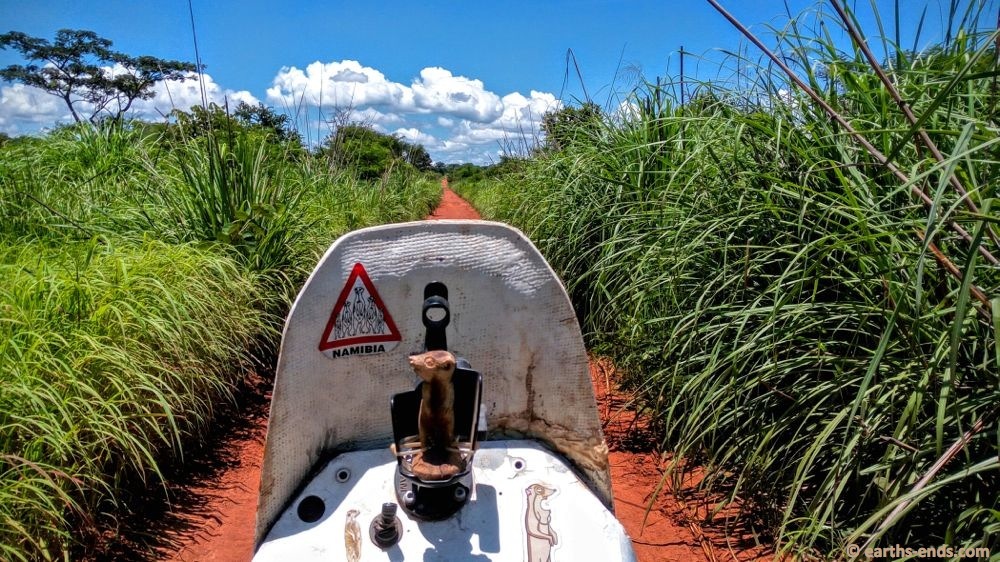
Roads on the north side… not much evidence of vehicle traffic here.
But as I said, that observation was only made with further future examples to support it and enough time looking back to process it all; so you the reader are getting a bit of a look into the future there. At the time we were riding off the ferry in this post, we were still very cautious, very suspicious of others, and looking out for one thing and one thing only… us. Ok ok, “us” is really two things, but you get the idea, we were number one… both of us… ah fuckit. Anyway, moving on…
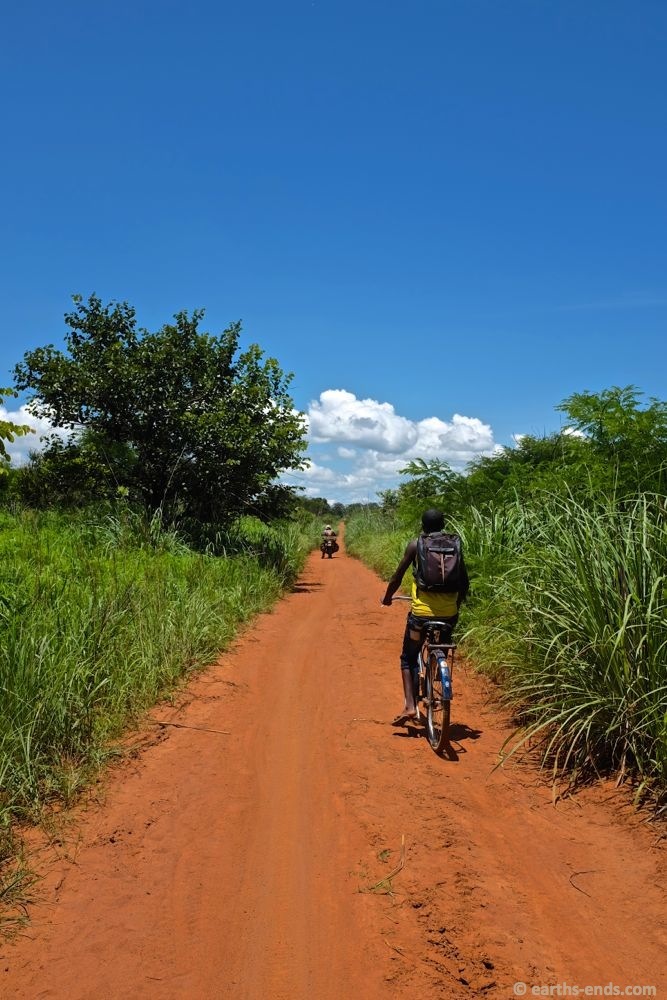
No cars, but lots of pushies though… this is the staple means of transport for Congolese. The humble bicycle.
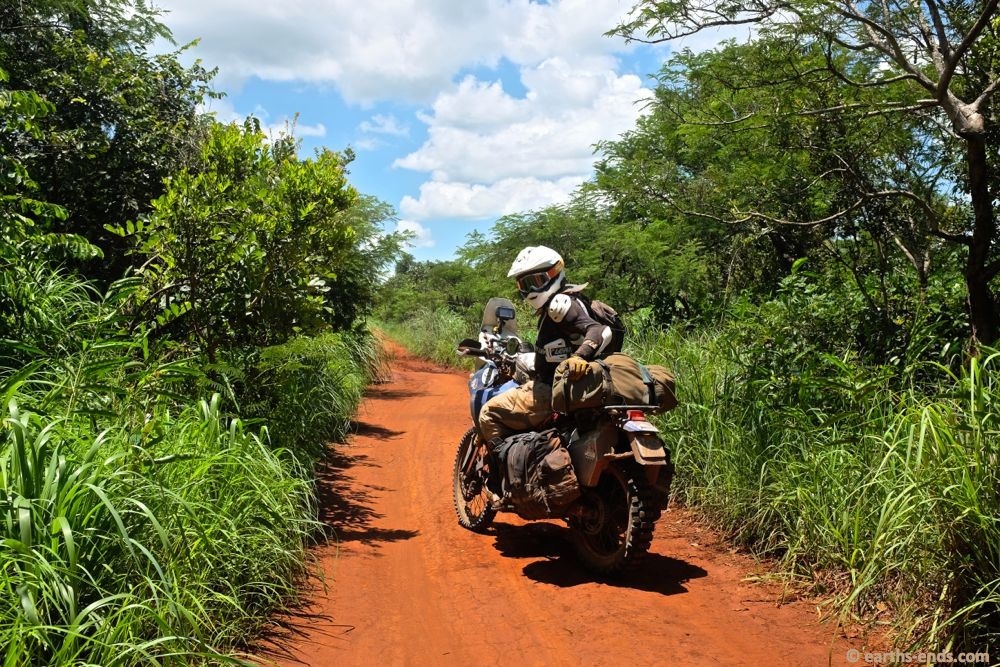
In the early afternoon the weather was still decent, and the riding was slow but easy for the most of it.
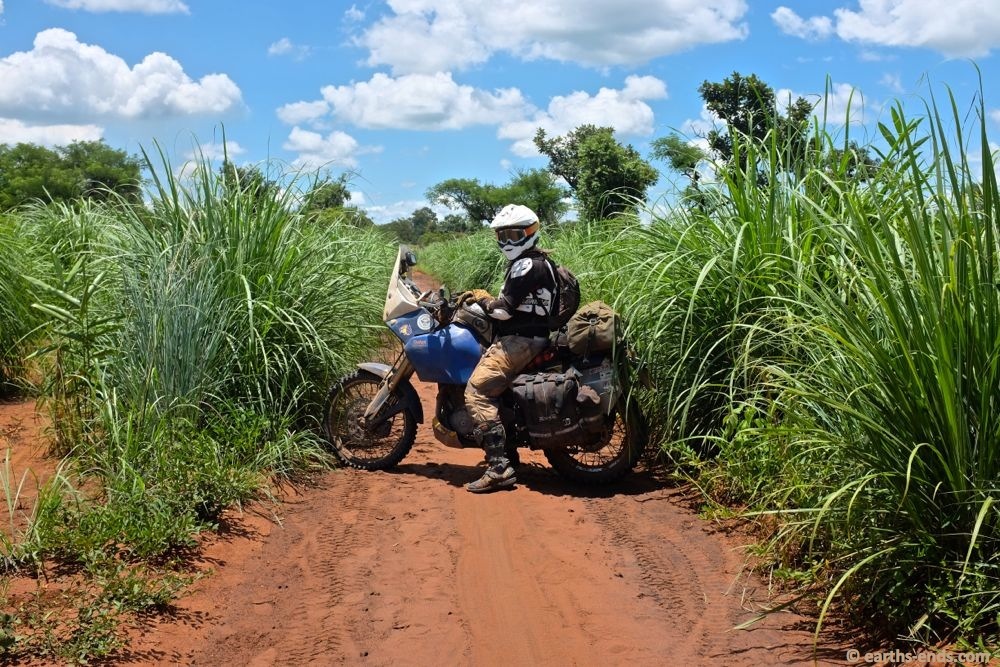
Getting narrow and slippery in a few sections.
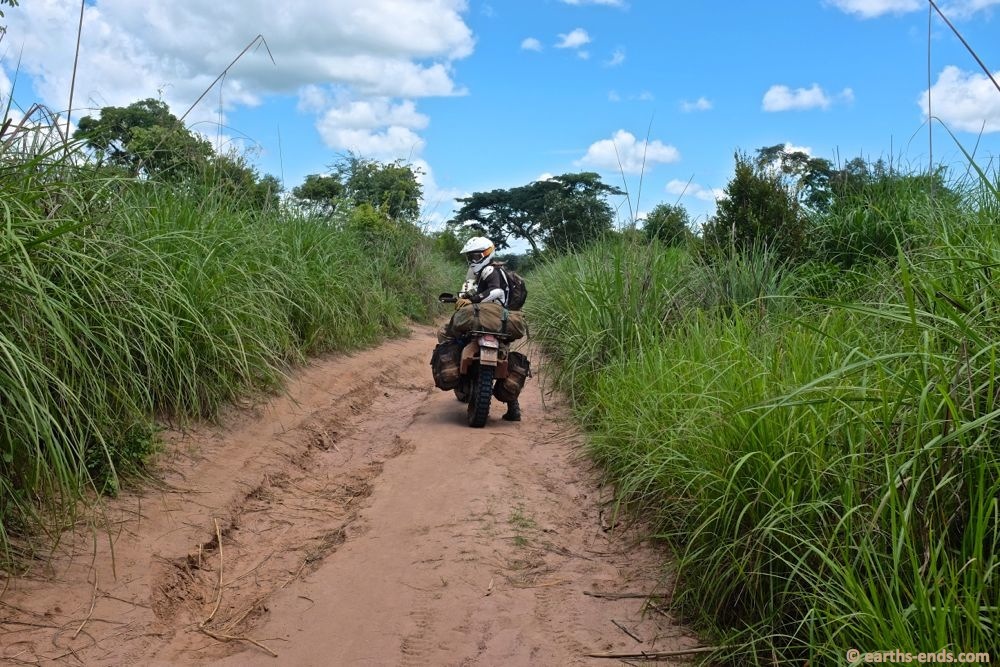
Eroded sand trough savannah
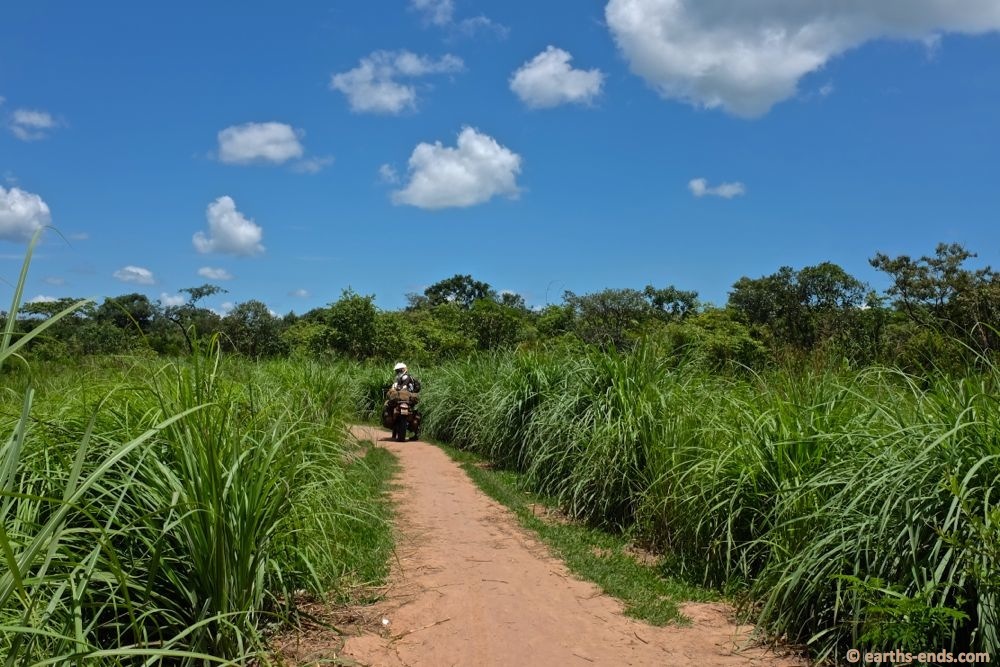
And more of the same. The National Highway N39 reduced to basically single track for kilometre after kilomtre.
North of the river got noticeably less vehicle traffic and the “road” deteriorated quickly to “track” of various quality. Mostly sand, quite a lot of it eroded, and lots of it very narrow. But as we headed further north, sand and savannah made way for red clay and jungle, although as we are still in the transition between the two we frequently seem to be switching back and forth; sandy savannah, muddy jungle, muddy savannah, sandy jungle… With storm clouds brewing all around us, and one stage even starting to dump on us, we picked up the pace to try to make it Luiza before the rains started properly. The last thing we wanted was for the moist and slippery, but still ridable clay, to turn into a hellish red slime quagmire.
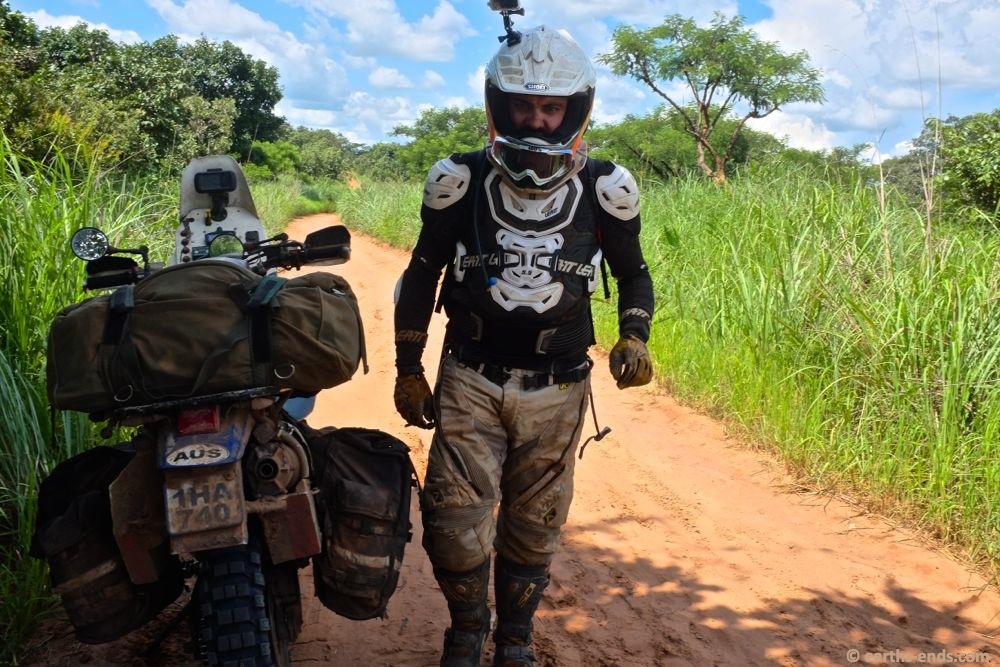
Fluids stop.
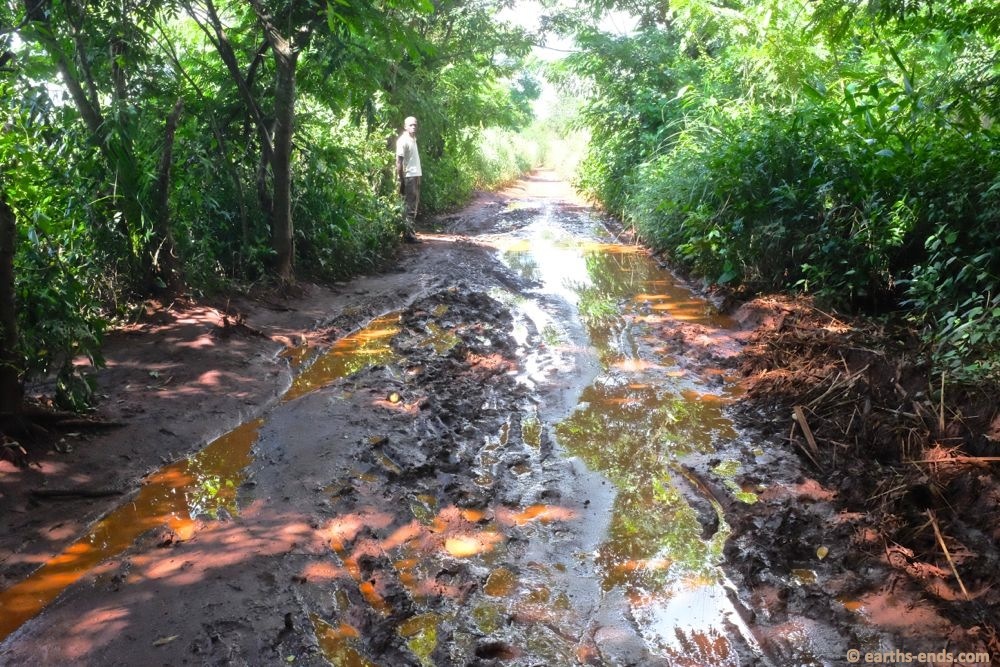
Ah mud… there was lots and lots of this as we got further north…
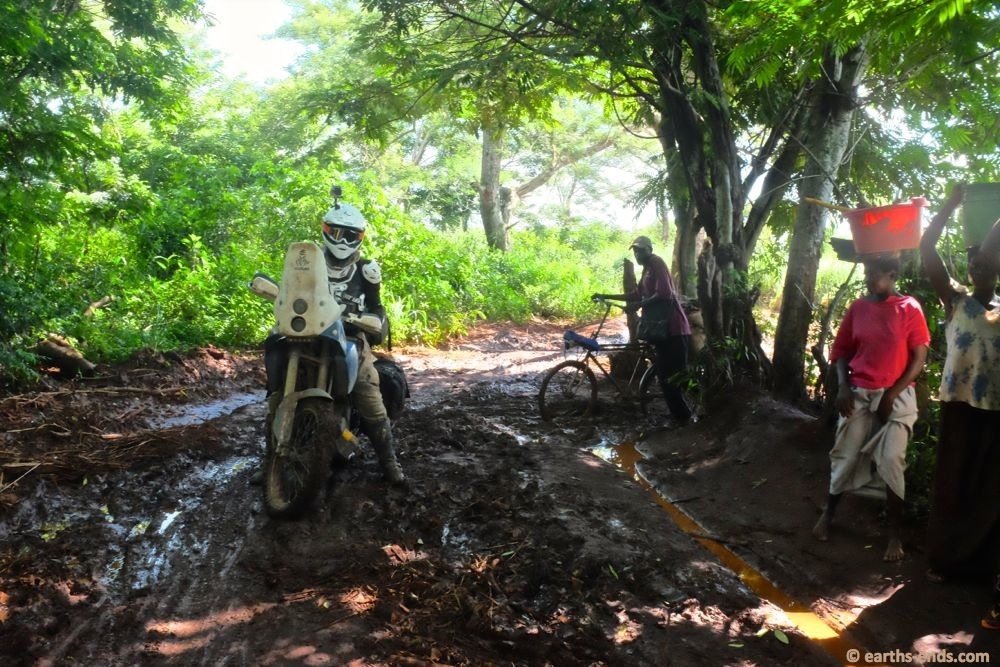
Slippery evil shit on a big bike…
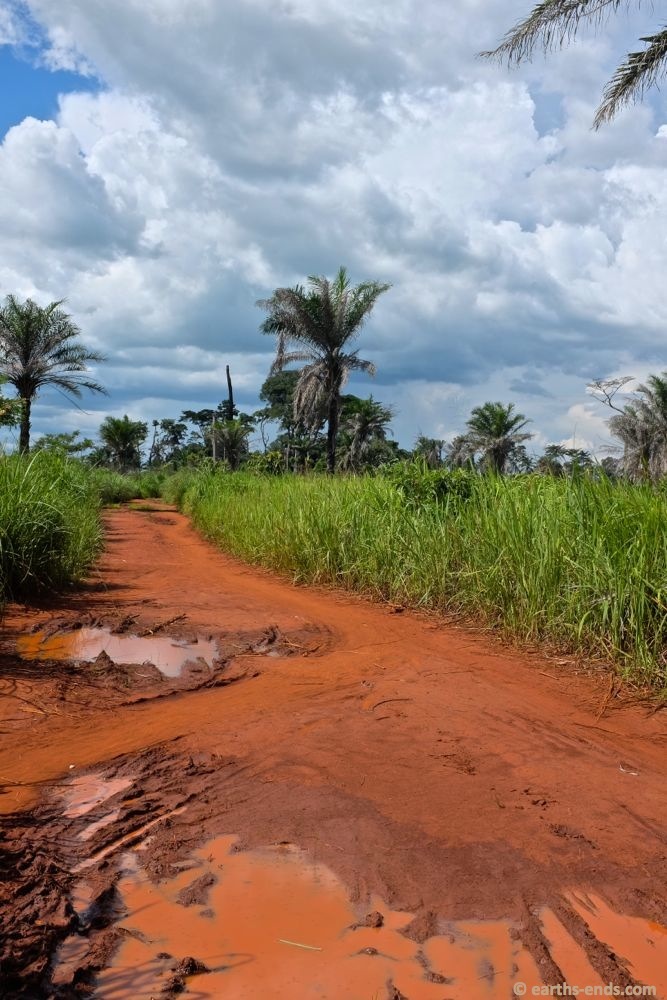
Puddle dodging as we got further north. The mud in the jungle was generally still wet but on the savannah there was sun to dry it. We generally rode around puddles where we could to keep mud out of the chain/sprockets/brakes, but also because some of the puddles were deeper than the looked like they would be and generally always damn slippery.
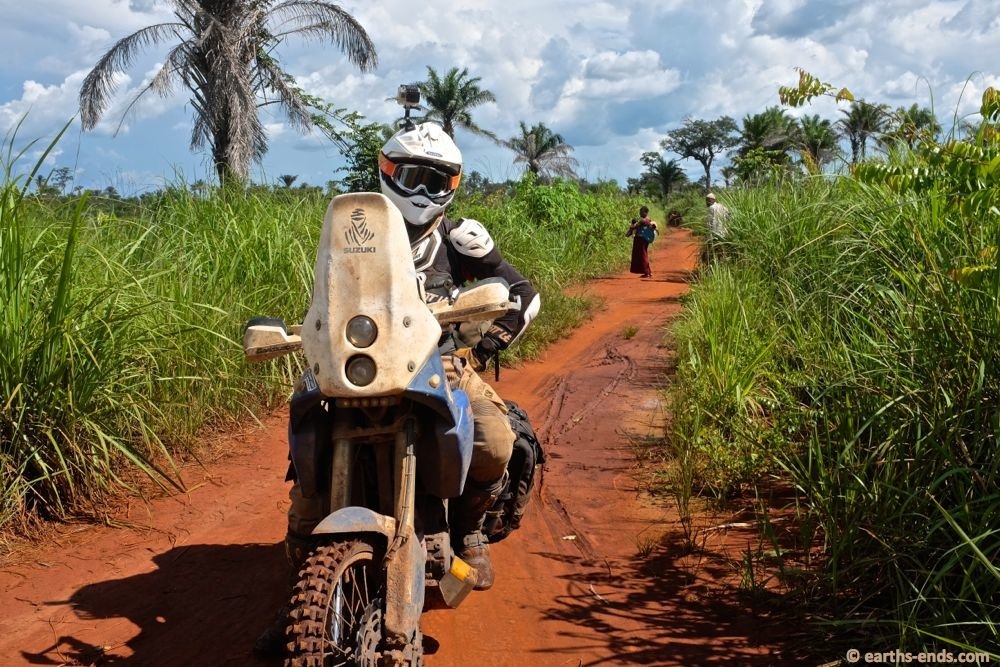
Slow going… riding like this. When moving we were moving we were averaging about 35km per hour. With stops about 30kph. Later in the afternoon we upped the pace a bit but only to an average of about 40kph… we wanted to beat the rain but we were never going to go silly. Not out here.
5 hours after getting off the ferry we had knocked of 160kms and we made it into Luiza before the rain did. Another day done with the weather gods smiling down on us. We sorted somewhere to stay, cooked up some food and readied ourselves for a final 200km push to Katanga, our first proper city since Kolwezi, the rough halfway point of the crossing and a planned rest day we were really looking forward to, and judging by the smell of us, really needed.
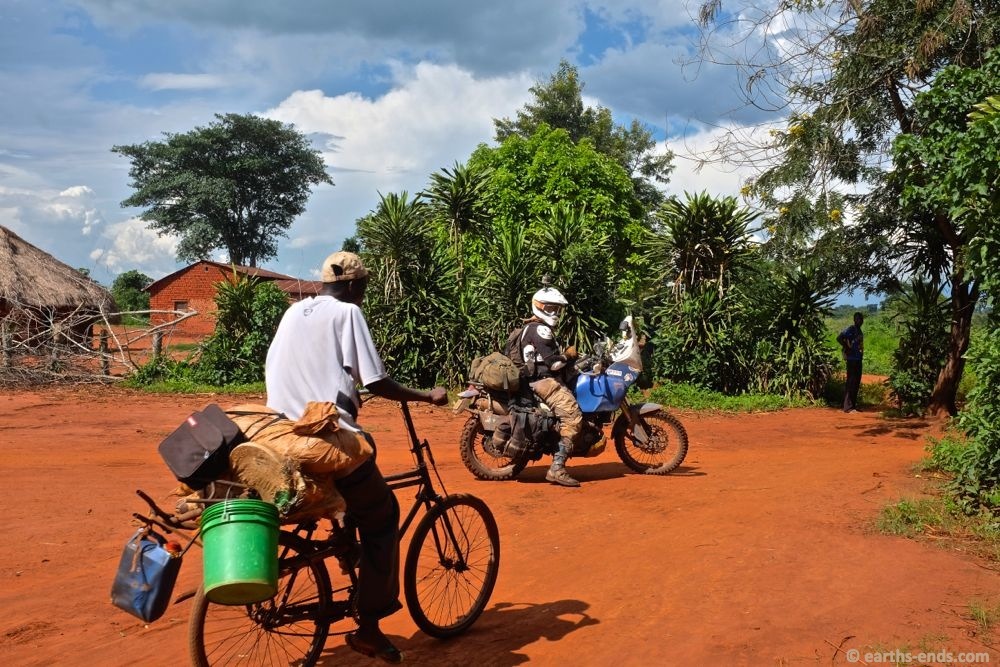
A few smaller villages and clouds brewing in the background.
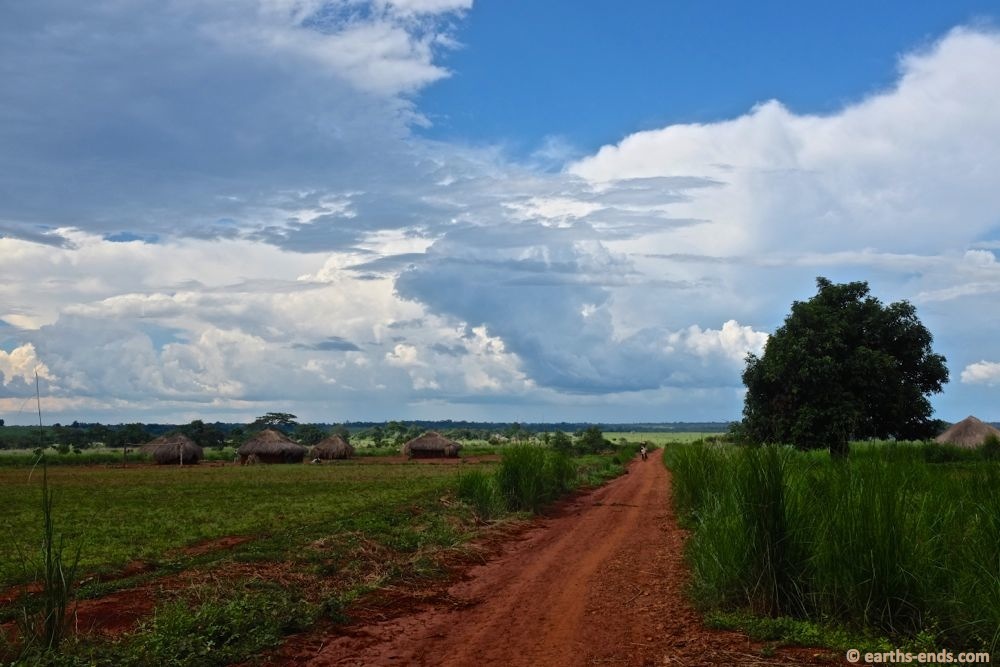
Some easy savannah riding after a bunch of jungle mud.
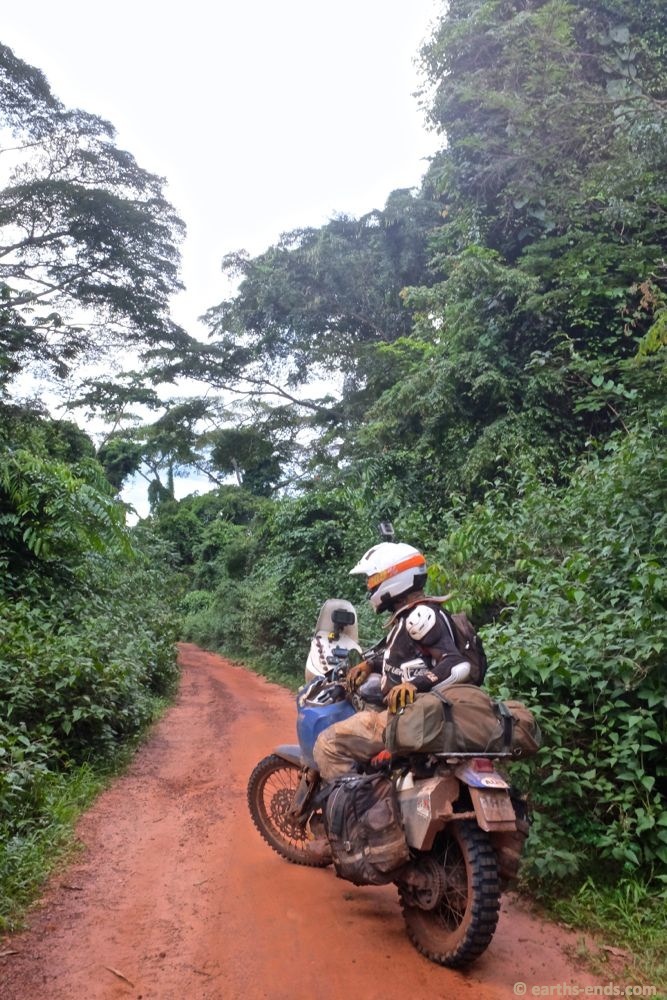
Back in the jungle, and with storms all around. About 500m after this photo was taken, we hit the edge of a storm and got a little wet, but gambled that we should keep going and hopefully pop out the other side of the storm which we could see wasn’t so far away. Better to push on and risk getting wet then stopping and guaranteeing having to ride on greasy red clay trails. Which is what happened in the end thankfully – we got away with it, we and the roads didn’t get too wet.
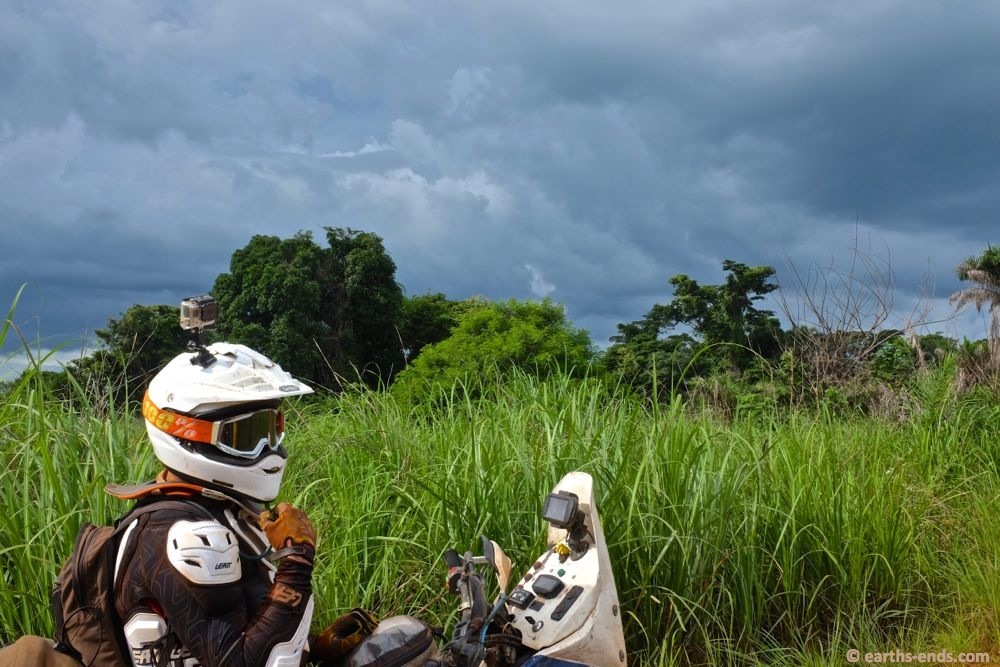
Late in the arv and storms, storms, storms. Riding in the Congo in the wet season isn’t so smart.
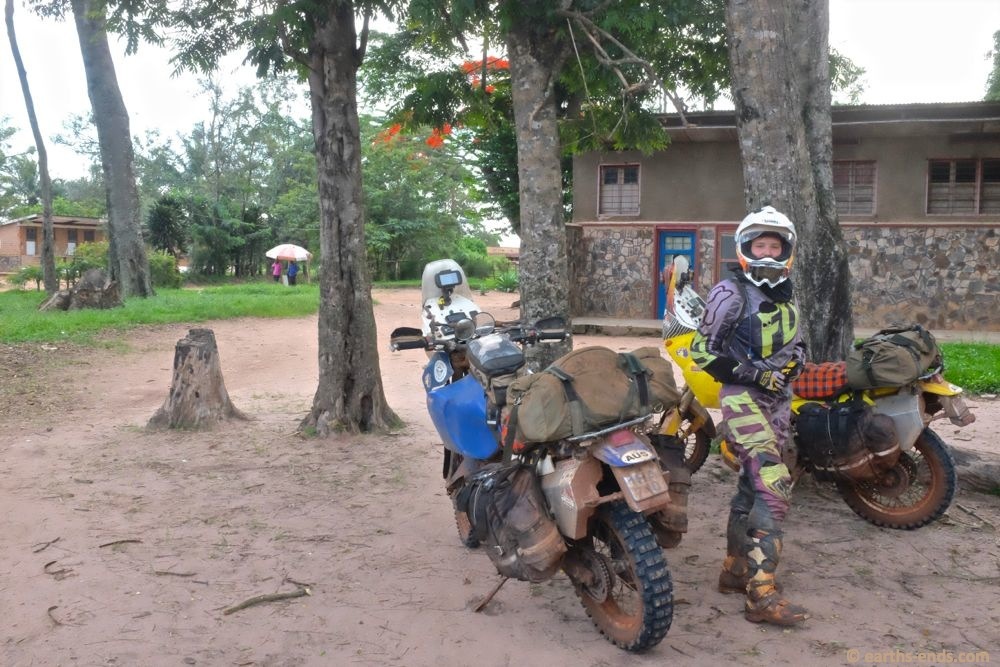
We pulled into Luiza and found the catholic mission where we were hoping we could get a spare room. They told Tan their rooms were all full as they had a “hygiene” workshop on for all the medical clinic workers in the area. So they gave us some directions to a small local guesthouse.
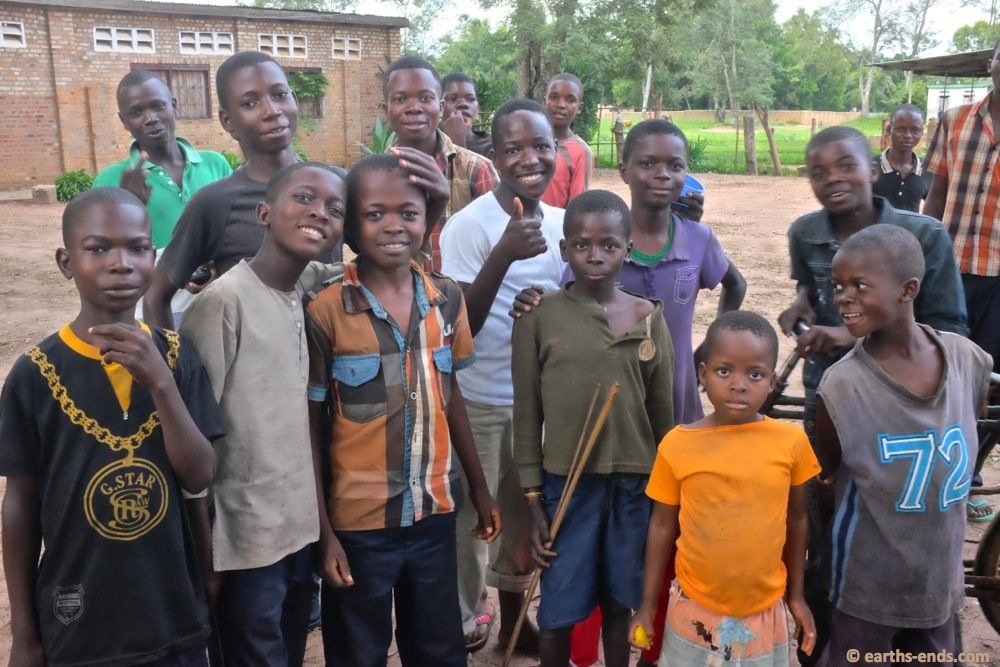
Stop the bikes anywhere, and crowds gather…
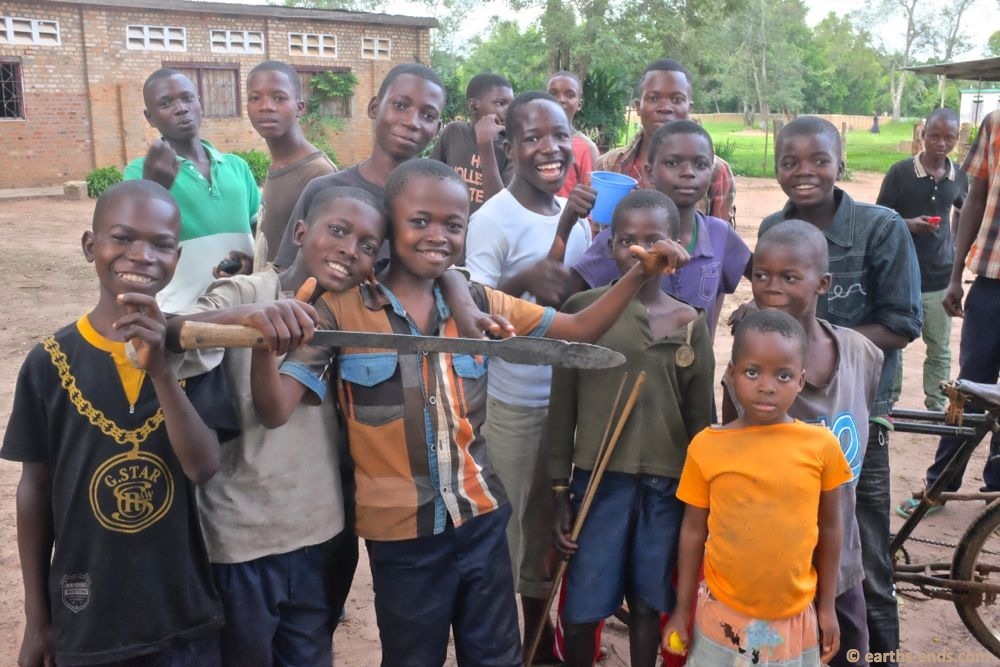
They love to pose for the camera. That machete is shaped like that because they use the end of it to dig for root vegetables like yams and cassava.
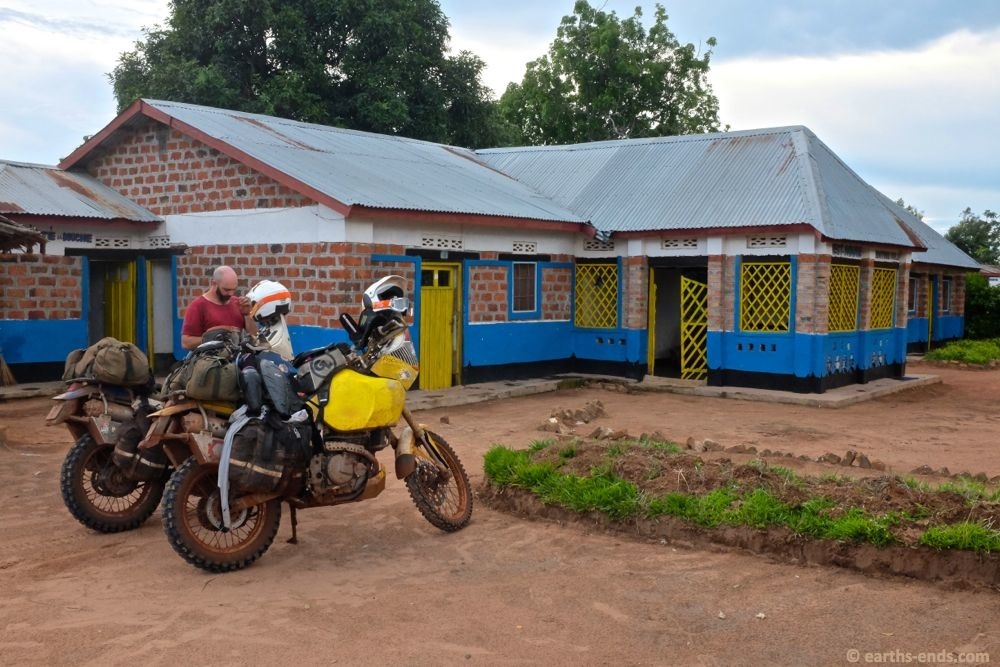
The guesthouse in Luiza where we spent the night. Co-ords S7° 12.245′ E22° 23.59’. Cost 10000 francs for the 2 of us for the night.
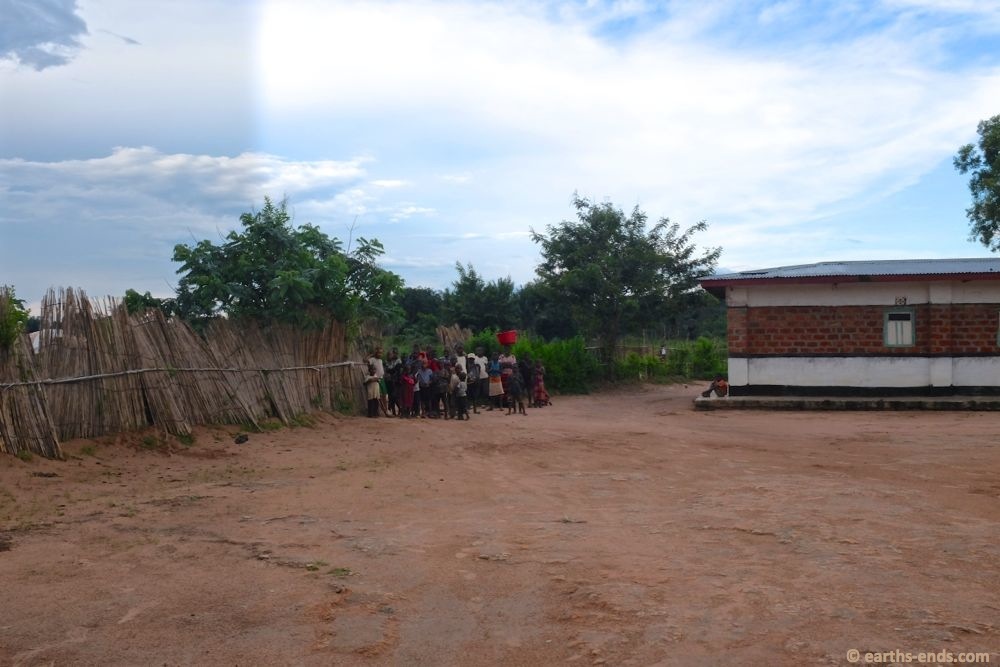
As I said, the bikes stop and crowds gather. People just don’t see foreigners in places like this. Not unless they are missionaries. Weird how this photo has got this line down it… dunno.
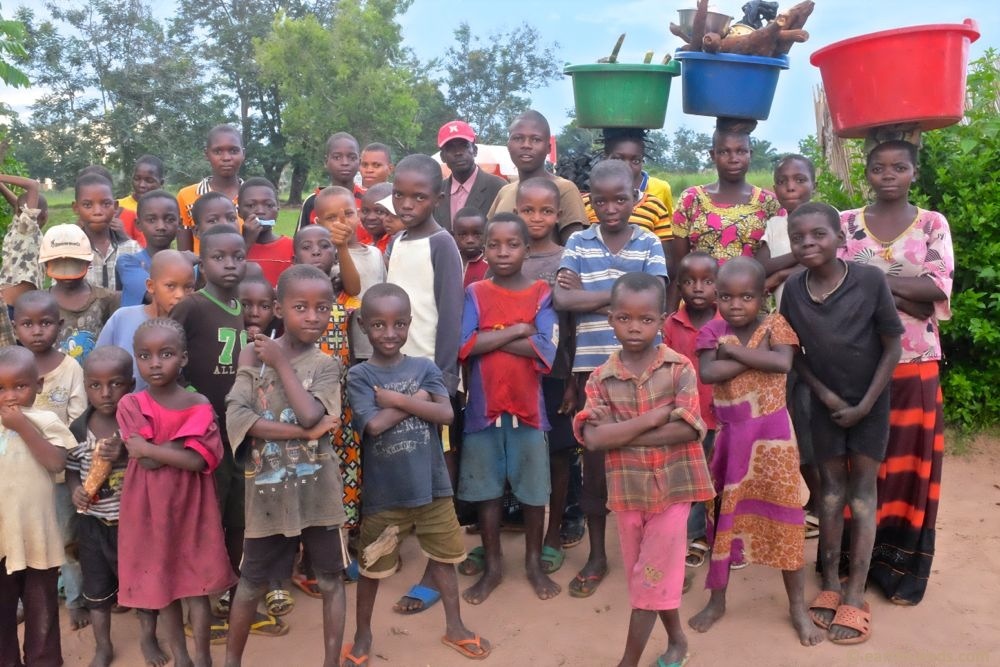
The gawkers… the ladies had been out collecting yams and now were coming back into town. The majority of the Congolese population survive on a combination of subsistance farming and gathering foods from the forest.
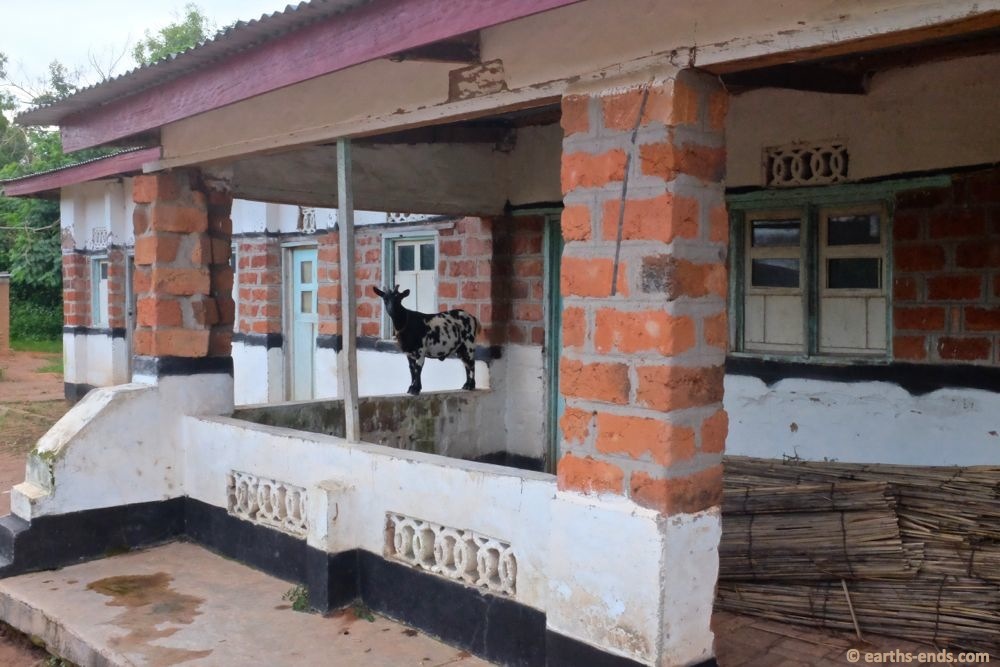
It wouldn’t be an African Guesthouse without a bloody goat hanging around somewhere.
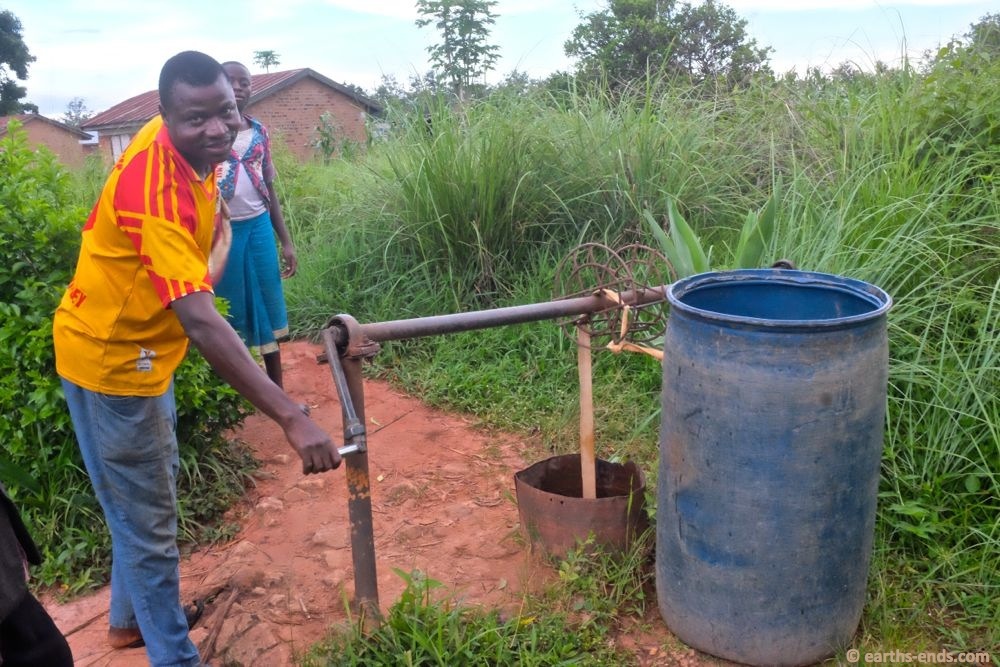
Bringing water up from the well for a bucket shower. It was cold but I needed it.
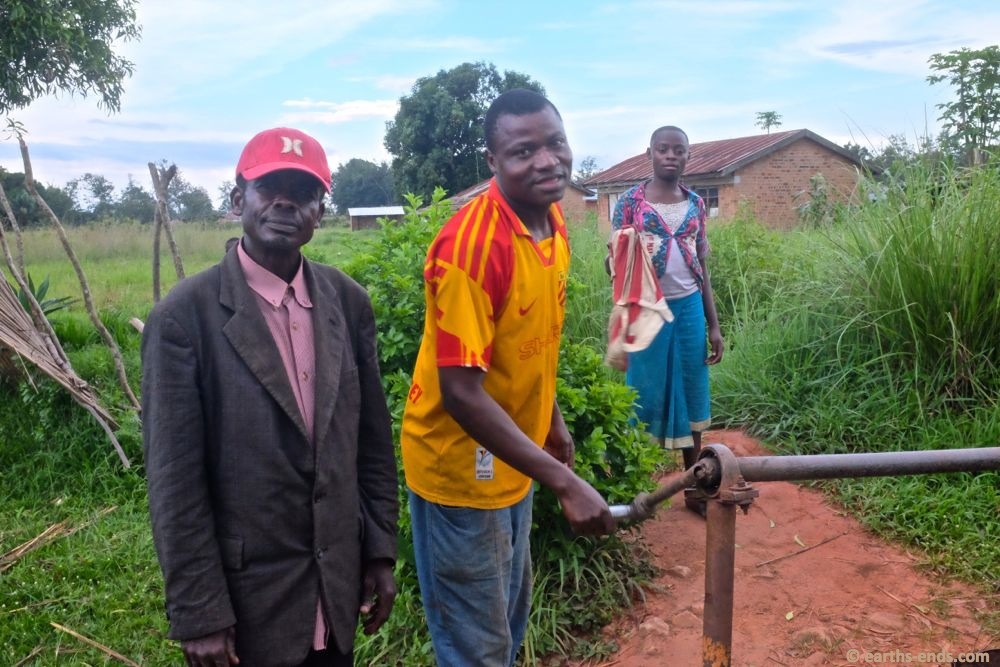
The fella on the right ran the guesthouse, the fella on the left was Luiza’s DGM official. When we arrived at the guesthouse we got told we would have to register with the DGM, but we kinda just ignored them and hoped they would give up. Then this guy arrived with his DGM ledger, but he was polite and didn’t request any money from us. He recoreded our details and registered us and that was it. All very painless… with this DGM guy at least.
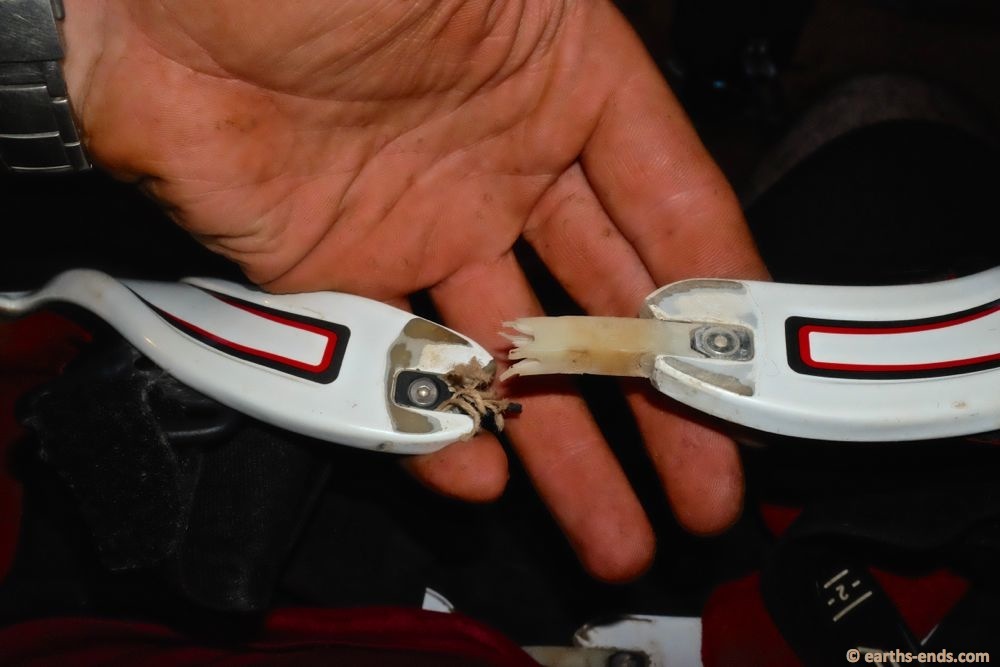
When we had started the ride in the morning, I’d found one side of one of my knee braces broken. We needed to go so I just put it on as is, and when I took it off that night I found both sides broken. 16 months of continual use I suppose something has to give. So… I needed a repair, to make them at least usable again.
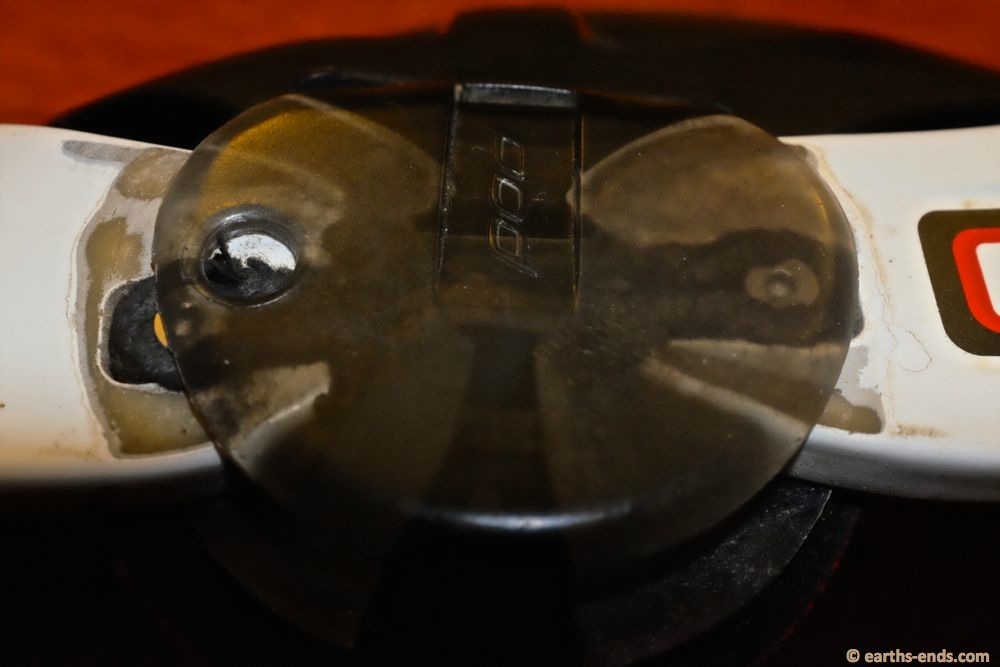
The repair… A piece of shoelace. It was finicky but got it done and made the brace at least useable again. I had to tie a knot in the shoelace but within the hinge there simply wasn’t enough room for a knot. So I trimmed back the shoelace ‘outer’ and then tied a knot only with the core of the shoelace.
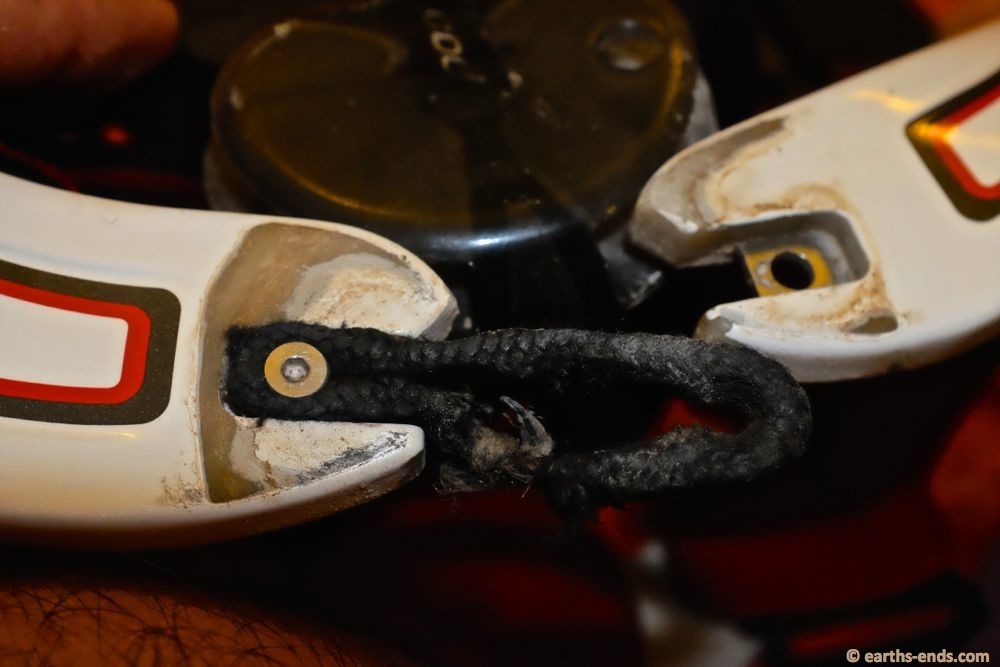
This worked well and for a long time, this is the repair 15000kms later about to be replaced with proper spare parts I’d brought back from Australia.
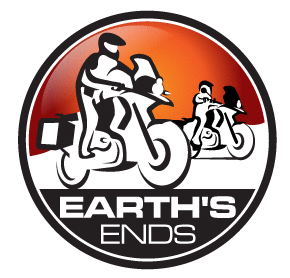 Earths-Ends
Earths-Ends
Enjoyed thoroughly!!